#but it fit the time period and jonahs potential interests
Explore tagged Tumblr posts
Note
when are we gonna talk about jonah's movie adventure in /post/156339807087/saintjimmys-i-mean-theres. when did this happen on his timeline. what did he go see. did this make him a bad boy. who are these other delinquents he went out with. how many people know about this scandalous excursion. ALSO: "although he has had a whole year in the REAL WORLD, it hasn’t been enough to catch him up on pop culture." what kind of pop culture has he been exposed to!!! jwoww's top ten fave movies go go go
1) that thread was Iconic2) WE’RE GONNA TALK ABOUT IT RIGHT NOW
—
It was the last week in April, and Utah was finally starting to feel like Spring. Sunflowers were starting to sprout. There was some green to break up all of the brown. Colorful.
Sixteen-year-old Jonah had recently started his new job at the grocery store in the neighboring town. Now finally of legal age to work, the eldest son knew it was his responsibility to help bring in money to support the family, especially with his father gone. Though the community had been kind in assisting them during this hardship, Jonah had six brothers and sisters, and they all needed to eat.
This job would eventually, to Jonah’s surprise, bring him so much more than just a small, biweekly paycheck. It would bring him the gift of awareness. In just his first week alone, he was overwhelmed by the differences.
The way people dressed. It was so improper. Disrespectful. People disrespected their bodies with tattoos and piercings. They wore the color red. Women wore jeans. They wore their hair down, or had even cut it short. Make-up accentuated their features. Exposed their necks, arms, and legs. Where were their long, conservative undergarments and pastel, feminine prairie skirts? Even in the warmer weather, it was always important to keep yourself covered. It reminded you of your commitment to the Lord. It was soft, feminine. Here, women wore bold colors with harsh sayings scrawled across the front. How were they allowed to do this?
It was like he had stepped into another dimension.
There was always music playing in the store: very modern. Jonah hadn’t been allowed to play music at home–if they listened to anything, it was usually recorded sermons—but before long, the boy found himself humming along to the tunes. They were always so catchy. Easy to learn. He liked the ones with heavy drums or bass, a steady beat that would guide him through the song, but loud, aggressive music like that didn’t come on too often.He was quietly rocking out to The Rolling Stones while stacking cans of tomato paste in aisle three when one of his coworkers came over to him. Jonah was the youngest one there by at least two years, but he had taken a liking to all of his fellow employees. They were all so fascinating. He loved to listen to them talk and tell stories, and the funny thing about people is that they love to hear themselves speak, so they grew fond of the boy quite easily.
“Hey, Jonah. We’re all going to see the new Avengers movie tomorrow night. Do you want to come?”
He paused. “I’m sorry, what?”
A movie. But films and modern television were forbidden. There wasn’t even a cinema in their town. Such things rotted the soul and led to immoral actions, like corruption and forgetting to pray. Deprivation brought one closer to God. He knew all of this. But the more his coworker talked about it, the more he wanted to go. The more he needed to find out what it was like. And was it really so wrong if no one found out? So, he enlisted a little help.
Enter: Matthew. A fellow teenage boy from the community. Best friend and partner in crime, enabler of all things delinquent. Picture messy blonde hair, a crooked smile, and a few inches taller.
“Matt, we have to go see that movie.”
If anything, the boy gave him an alibi. When asked, he could just say he had been out with Matt. Nothing out of the ordinary. Only this would be so much more than ordinary.
Twenty-four hours of excited jitters later, the next night rolled around. When they made it to the theater, he saw the poster and stopped. This was it.
He didn’t really know what to expect going in, but the film was everything he thought it would be and more: action, suspense, cool special effects. This experience would later lead him to gravitate towards anything exciting with a simple plot and little character development (think big booms).
After the movie ended, they drove back into town as though everything was normal, but something in him changed. The new experience, partnered with the adrenaline of doing something against the rules, electrified him in a way he could have never imagined. It awoke something in him. (He would remember this feeling later, while hopping over a fence at 11 o’clock at night to do something even more forbidden.)
Since that night, he hasn’t even seen ten movies, but the itch to experience has yet to be scratched. After his conversation with movie-buff Jimmy, he hopes that the knowledgeable brunette can share more films with him so he can continue his journey of being fully-integrated into this new society. (Starting with Shrek 2).
#about#( UTAH. banished from eden )#drabbles#asks#i hate myself for giving the shitty second avengers movie even a second of screentime in this ask#but it fit the time period and jonahs potential interests#i could go on a 24hr rant as to how much rage and injustice that film arose within me but i'll keep my salty ass thoughts to myself#ANYWAY thanks ella this was fun let's do it again sometime#anonymous#flashback
4 notes
·
View notes
Text
Puttering Around — Thoughts on: Secret of the Old Clock (CLK)
Previous Metas: SCK/SCK2, STFD, MHM, TRT, FIN, SSH, DOG, CAR, DDI, SHA, CUR
Hello and welcome to a Nancy Drew meta series! 30 metas, 30 Nancy Drew Games that I’m comfortable with doing meta about. Hot takes, cold takes, and just Takes will abound, but one thing’s for sure: they’ll all be longer than I mean them to be.
Each meta will have different distinct sections: an Introduction, an exploration of the Title, an explanation of the Mystery, a run-through of the Suspects. Then, I’ll tackle some of my favorite and least favorite things about the game, and finish it off with ideas on how to improve it.
If any game requires an extra section or two, they’ll be listed in the paragraph above, along with links to previous metas.
These metas are not spoiler free, though I’ll list any games/media that they might spoil here: CLK, CUR.
The Intro:
In our next Jetsetting game, Nancy travels back from Modern-Day England and straight into 1930s Titusville (aka River Heights 70+ years ago) to help an acquaintance who’s in the middle of two unrelated plots to turn Titusville upside down.
A game famously reviewed as “pleasant but inconsequential”, Secret of the Old Clock tends to be passed over for both praise and censure, famous for two minigames (the sewing minigame and the mini-golf) but otherwise overlooked. It’s a shame, really, that it’s sandwiched in between two much flashier games, as CLK is a wonderfully solid entry into the Nancy Drew series. It pioneers the two-culprit variation on the standard Nancy Drew plot, tackles a new time period, and includes dozens of in-jokes towards the Nancy Drew books.
It’s also the first introduction of Carson Drew as a phone character, which is a lot of fun, and makes sense that he’d show up in the game that includes nods to all things canon. He doesn’t show up again until much later in the series, so it’s nice to introduce him here after hearing about him for 12 games.
As opposed to CUR right before it, CLK takes care to ground itself in a linear plotline, handling its story with relative ease and taking care not to reach too far out of the box. This is one of its greatest strengths, and provides a much better game overall because of it. It’s a simple story, pretty well told.
Though it doesn’t stand up to other more “simple” games before it such as CAR or DDI, it never reaches any of the lows of SCK, FIN, or CUR, and allows the player to be sucked in to its fantastic facsimile of life in the 1930s for teen sleuth Nancy Drew — blue roadster and all.
The Title:
As CLK is a mixture of the first four Nancy Drew books, it retains the title of the first book. As a nod to the history of Nancy Drew, it’s a great choice for the title.
Unfortunately, though the Old Clock does appear and hold secrets, it’s just not prominent enough to deserve the title that it holds. The other three books — The Hidden Staircase, The Bungalow Mystery, and The Mystery at Lilac Inn — are other options, and The Mystery at Lilac Inn would have been the most appropriate title. It doesn’t have the immediate name recognition, which is why they didn’t pick it, but it really is much better and encapsulates the game much better, as the game revolves around the Mysteries that are tied to the Inn.
That’s all I really have to say about that, so onto the mystery!
The Mystery:
Nancy Drew is summoned to the Lilac Inn to help Emily Crandall, the friend of Nancy’s friend Helen Corning, who needs to put her recently deceased mother’s jewelry into a safe, and figures that Nancy’s father would have one.
If it sounds to you like a simple, if slightly contrived premise, then you’d be right.
Once Nancy gets there, however, she finds out that Emily is cracking under the pressure of running an Inn, that her guardian Jane Willoughby isn’t as much help as she should be, and that Emily and her mother were depending on money from Josiah Crowley’s will, which mysteriously only included his recent ESP teacher, Richard Topham, rather than the Crandalls and the local banker.
From there, things go from bad to worse as the inn’s kitchen catches fire, Emily’s jewels are stolen (and partially returned), and voices in the walls start manifesting — not to mention the fetch quests around Titusville that Nancy is sent on and the ridiculous Richard Topham hiding everything about himself other than how pompous he really is.
Nancy soon figures out that this mystery is two-headed, with one side revolving around the Inn itself and the other around Josiah Crowley’s real — and missing — will. Our villains catch on too, however, and Nancy has to race against their suspicion to expose the frauds, discover hidden secrets and identities, and solve the Secret of the Old Clock.
As a mystery, this one really is quite good for its time. Dual villains, each unconcerned with the other, hidden inheritance, Shakespeare references — it’s got it all. Though Jim Archer lets it down a bit in his sheer nothingness, and it functions as a howdunnit with a weird whodunnit beginning, CLK is solid ground after the incredibly shaky mystery in CUR, and it’s a lot of fun to play through.
The Suspects:
Emily Crandall is our protagonist and resident watering pot of CLK who spends the game moping and being Generally Unhelpful. Her mom’s death notwithstanding, Emily’s stressors are the Inn, her lack of money, and her fake-guardian making her think that she’s crazy.
So maybe her total lack of common sense in wanting to call in Nancy because Nancy’s bound to have a safe at home is a result of copious amounts of mental stress. One can only hope so, as by her next birthday she’s the legal owner of the Inn.
Emily actually would have been interesting as a villain, but she, like Jim, just isn’t enough of a presence in the game — which stands out since she’s the closest we’ve got to a main character! She cries a lot, she sits a lot, and that’s about it. She would have had to be a misguided villain, convinced that her guardian (who would have had to actually be Jane Willoughby) is after her fortune…but HER still isn’t up to that level yet, and it’s probably better that they went with a story they can tell wholly and mostly convincingly.
Honestly speaking, Emily, being as she is, is a more successful Linda Penvellyn, which I don’t actually think is unintentional. She’s being harassed and abused by someone who’s basically a family member but is still largely unfamiliar to her, the tie to her remaining family is gone (though Emily’s mother is dead, unlike Hugh Penvellyn), and she is being gaslighted to believe that she’s crazy.
Emily was allowed more agency, more screen time, and more pity by the writers and creators, and because of that, her situation with her Evil Jane is far more obvious to the average player, and she’s treated with far more sympathy than Linda historically has been by the fandom (though recent fan discussion has begun trending in Linda’s favor, which I think is wonderful and fantastic).
Jane Willoughby is, of course, not Jane Willoughby after all, but actually Marion Aborn, proving that identity theft in the 30s was as easy as…well, saying that your name was someone else’s name.
An acquaintance of the actual Jane Willoughby and a petty thief, Marion intercepted the letter about Gloria’s death and Jane’s status as Emily’s guardian and decided to try to cash in on potential cash by tormenting Emily until she signed over the Inn. Exploding the kitchen, stealing Emily’s jewels, and attempting to make the girl think that she was crazy to make her sell the Inn before her 18th birthday (after which Marion would receive no profits).
As one of two culprits, Marion is the more “subtle” culprit and has the more complicated background, but is also the one you have to deal with the most, and thus suffers slightly from being in the spotlight (and thus showing the obviously evil side of her) a little too much. As this game isn’t really concerned with its culprits as a centerpiece, however, Marion’s antics fit right in.
Marion also gets points for being a much more intelligent abusive culprit (contrasting Jane), working hard to make Emily think she’s crazy with a clear goal in mind and even going as far as stealing, then partially replacing, Emily’s jewels to really hammer home the idea that the girl wasn’t mentally well to others — and to Emily herself.
Richard Topham is a self-proclaimed ESP expert and everyone-else-proclaimed dick who ended up somehow being the beneficiary of Josiah Crowley’s will, despite his spoken intentions to leave it to the Crandalls and Jim Archer. He also has a very obnoxious cat named Uri, voiced by a lovely cat named Carl (though I bet you were expecting me to say Jonah Von Spreecken — never fear, he shows up as the Tubby Telegram guy!)
Richard is our other culprit, guilty of falsifying Josiah Crowley’s will when no one could find the original, leaving most everything to himself rather than to the Crandalls or Jim Archer as Josiah wanted. A slight throwback to the 1920s obsession with spiritualism that itself was a post-war reaction to massive death, Richard is as sleazy as they come, testing Nancy for an “inferior mind” and taking advantage of every situation in order to come out on top.
As a culprit, Richard’s technically the one with the bigger crime, but is overshadowed by the plotline with Emily and Marion and is thus a little forgettable, even though it was his actions that started this whole mess in the first place.
Finally, Jim Archer is the local banker who’s not having too good of a time during, well, the Great Depression, where hundreds of banks (and dozens of bankers’ hearts) failed. Promised a boon by Josiah Crowley, he, like Emily, is left in the lurch after the false will was presented. Jim was also a fellow student with Carson Drew at law school, but turned to banking as a career instead.
Despite his office being the location where Nancy finally figures out the mystery of the titular Old Clock and where she discovers that “Jane” is actually Marion, Jim really doesn’t have much to do in this game. He gives Nancy the dreaded sewing minigame and reminds the player that the stock market crash was a recent event, but other than that has very little impact.
Jim would have been a poor choice for a villain — he just doesn’t have the personality or impact necessary — as the only storyline readily available would have been him doing Dirty Deeds to keep his bank afloat…except for the fact that if he were a villain, his bank would have been doing fine, with no need for the will anyway.
The Favorite:
My favorite moment in the game, odd as it might seem, is the CB radio conversation-slash-puzzle. It’s so rare in these pre-Nik games that we actually get to see the lives of those not really related to the case/mystery and get a sense for the world spinning on despite the incident, and this is a great example of that done right.
Like the “freezer moment” mentioned in my Danger on Deception Island meta, this moment where Nancy can see how Josiah Crowley’s life has impacted people for the better, rather than the main game where so far his death has made everything worse. It’s a wonderful moment, and honestly the game is worth replaying on the merit of that alone (though there are many wonderful things about it).
My favorite puzzle is getting down into the secret passage (and all of the puzzles within the passage). It’s a ton of fun to find hidden passages that aren’t full of Deadly Traps or human remains, and the whole Creepy’s Corner puzzle is delightfully campy and awesome.
The best location in the game by far is the carriage house, where the aforementioned conversation takes place. Beautifully lit, nicely hidden away in stages, and the only place that doesn’t feel like a 1960s set of a 30s period piece.
I love this game as homage to the original Nancy Drew titles; though they’re changed somewhat to suit both a video game style and the take on the original canon that the video game universe took (such as making Nancy’s mother’s death at 10 as it was originally, which was the smartest move they’ve ever done).
Video-Game-Style Nancy’s far more like her original 30s version than the sanitized, “fashion-ized” version in the 60’s rewrites — a fact that becomes more and more clear as the series goes on — and it really does show here, as cowboy-cop Nancy wrangles not one but two crooks.
Speaking of, the last thing that I’ll mention in this section is the fact that there are two different culprits, each uncaring of the other. In a game series that was originally only supposed to be 12 games long (meaning CLK would be the last one), this is a delightfully fresh take and it makes untangling who did what a lot of fun and makes CLK different from most games before it.
I’ll talk more about this in later Nancy metas, but the shift from “one crime, one culprit” to a more “spread the guilt” approach really makes the games go up a level or two in enjoyability and in complexity, and CLK is a great example of how just having two culprits really makes the game much more fun to play around with.
The Un-Favorite:
All of that being said, there are some things in CLK that I really don’t love.
The sewing puzzle is honestly the worst; it’s hard with a mouse and nearly impossible with a trackpad, it’s tedious, and it doesn’t matter for the rest of the game, which is probably the worst part given how much effort it takes. It’s a puzzle for a puzzles’ sake, and doesn’t tell us anything we don’t already know (we know Jim’s not doing well; we know it’s the Great Depression, etc.), not to mention not rewarding the player nor Nancy for the effort.
My least favorite moment in the game would have to be Nancy’s first encounter with Richard Topham. Nancy’s autonomy is usually respected in both the 30s original drafts (less so in the 60s re-writes) and in the games, and Richard’s comments about lesser minds and his little test are, even with Nancy’s snarky comment about him in her diary, frankly out of place.
They don’t serve as a “relic of the times”, they don’t make us hate Richard more than we would have for stealing money from people who are literally drowning in bills and debt…and as much as the Nancy Drew books and character are feminist rather than Feminist, it’s honestly not great to have both his ‘clients’ during the course of the game be women that he treats the way he does.
It wasn’t necessary to have him behave the way he does, it contradicts the Spiritualist movement (which was most popular among women to a startling degree, and male Spiritualists tended to treat their female clients very well because that was the bulk of their clientele), and it doesn’t tell us anything new about him, because Nancy and the players already know he’s a fake and a blowhard.
The Fix:
So how would I fix Secret of the Old Clock?
The first and biggest fix I’d make is to include a strong storyline about Spiritualism. As noted several times above, Spiritualism was a huge force in the 1920s, and a period piece set in the year 1930 should necessarily reflect that. Quite frankly, all the nonsense about Jim Archer’s wife should just be cut and replaced with a big Spiritualism puzzle of some sorts.
I’m not saying a séance — no need to retread MHM — but an actual nod to Spiritualism (and through it, the first World War, which given Nancy’s age of 18, would have happened when she was a child) more than just “and this character is a psychic of sorts, don’t really think about it” would improve the game and ground it in its time period. Other than the references to money troubles and the ease of identity theft, there’s not much to ground CLK in its period, and I really think a Spiritualism storyline would aid that.
And if Spiritualism is involved, Richard becomes a more present, more serious character — and a more serious threat. It also opens the opportunity for the two plotlines to intersect — is Emily being driven crazy by stress, an enemy, or a malevolent spirit (which could even be supposed to be her mom, should they want a slightly darker turn)? Richard might visit the house to ensure there are no ‘malevolent presences’ around — and ensure that Crowley didn’t hide his will there.
It wouldn’t become a ‘haunting’ game; it would instead work on the aesthetic of familiar spirits — something that would be explored more fully in the next game.
I know this has been said, but I can’t emphasize enough that the sewing puzzle should be cut, even if there’s nothing to take its place. It’s a perfect example of the wrong puzzle, the wrong controls, and the wrong side-quest at the wrong time. I’m also not sure why they made Jim Archer a middle-aged banker rather than Helen Corning’s fiancée, but that’s too small a change to really bother with.
The other important change I would make is to change CLK from a weak whodunit — our culprits are already clearly the culprits — to a strong howdunit, which is what it really wants to be.
The beginning can stay the same — Nancy’s journey, Emily’s mother’s death, Richard’s faking of the will, Josiah Crowley’s death and promises, etc. — but introducing Richard Topham at the Inn, there to ‘visit’ and offer condolences and because he sensed Heavy Psychic Energy and wondered if it was coming from the house or from Emily. Have Emily tell Nancy in confidence that the other reason she called her in was because she’s either going crazy or being attacked on all sides, and the game can proceed on from that point.
Because the villains aren’t secret or even quasi-hidden in plain sight — save for Marion’s identity theft — it’s a much more natural shift to a howdunit than other games. Emily’s living in fear of Marion, running the Inn, and the possible Malevolent Spirit that may or may not be her mother haunting her through the Secret, Secret Passageway in the Inn, and Nancy’s suspicious of Richard Topham who inherited all of Crowley’s wealth, of the ‘hauntings’ of the Inn, and of the missing will and the gifts Josiah left behind.
Those two plotlines alone are enough to carry the game, especially including the Edutainment section on Spiritualism that would tie in with Richard Topham (and possibly include Emily’s mother having an interest due to her husband dying in the war), and so Jim Archer just isn’t needed as much. Whether he stays in the game in an even more reduced role or whether he’s replaced by a ninth-hour character in the form of Emily’s actual guardian, the real Jane Willoughby, is up to personal preference (though I personally like the second option).
Like all the Jetsetting games, CLK begins with a small problem that snowballs into larger and larger consequences. By emphasizing a Spiritualist plotline (culminating with the technology-based ‘encounters’ Josiah had with his CB radio friends), trimming down the fat with Jim Archer, and selling CLK from the beginning as more of a howdunit than a whodunit, CLK would improve enough to be more than just a good game, and become a standout of its era — as befitting the start of the titular teen detective.
#nancy drew#clue crew#secret of the old clock#nancy drew games#CLK#nancy drew meta#long post#my meta#video games
17 notes
·
View notes
Note
So what issues would you like them to tackle that hasn’t already been done on the show before?
(I just want to say this is my first ask ever and I've been here since... God maybe 2013? So thank you!!)
I would LOVE to see a new dimension to sexuality. I'm also casually of the team that's "Sara herself should say Bisexual" because Bisexual has only been said once on screen and Nate said it casually.. We have a scene where Sara says tells Nurse Lindsay that Lesbian isn't a bad word yet the show kinda doesn't act that way about Bi. Bi erasure is an issue that would be interesting-- since Sara is with Ava, it would be neat to have some line of "i didn't pick a team" or just along the lines of Still Bi With A Woman.
(They also missed an opertunity with Charlie to use neutral pronouns of some kind)--> a discussion further on gender identity would be cool too. There are casual set ups for this with Charlie, like in the Shakespeare episode, but nothing is ever really taken completely seriously or honestly even explicitly. I would really enjoy a nonbinary or intersex narrative in this particular context because I feel like the team of legends (as the people the characters are) would fit really nicely with that. But it would be cool to have a trans character that Gideon helps? Because the arrowverse trans character (in Supergirl-- Nia) is already transitioned. It would be cool to have a transitioning characer in a really casual way even (a particular scenario would be New Character leaving sickbey while someone else walks in. Other person asked if New is feeling OK and New just says like "oh yeah, just my hormones.). But yeah anything with gender identity.
I always hunger for more disability stories, but based on how they Wrote Sara's blindness... yikes. I remember watching a panel or something on YouTube about how Caity was hoping that Sara was at least going to have a cane or be shown to struggle with some stuff, but the writers ignored all of that. So its kind of touchy based on that but I think it would be really neat to have someone with a prosthetic (or even just an amputation, someone born without a limb, etc.)-- it would be a beautiful narrative about 'Gideon can literally grow you a new arm' and that character firmly saying no, this is me, having this difference doesn't make me less, you aren't "fixing" me because I'm not broken, I like myself, etc, whatever.
I know that for me personally one of the best things about the show is that Sara and Ava don't have to come out, and everyone just treats them like normal, but I think some kind of homophobia narrative would be good, not to a big extent but just to the extent like in S1 when Kendra and Ray move in 1950s and that dynamic only with the girls. Like, for the show to acknowledge homophobia in such a direct way, as they did with interracial relationships. This beyond the obvious homophobia of the Nazis. (I personally can't think of an aspect where its implied, but sometimes I can miss or misinterpret implicated stuff like that).
I would love to see a return to POC cultures and narratives (narratives outside of racism) S1 with Kendra and Carter and the Egyptian culture aspect, Amaya and Zambesi aspect. We see a tad bit of this with Zari and the bollywood scene, and Japan post WW2, but they are more side aspects now. It would be neat to go to India or other places in southeast Asia (culturally), or Central/South America. Overall, I would just like to see more of that cultural aspect because human culture is something that interests me a lot and I feel like can be easily casually thrown in with time travel--- traditional clothes, buildings, and ideals (an example of the ideals is the discussion in feudal Japan about the cultures views on death).
I feel like there was a lot of potential with Hank and Sara to continue that discussion about women in power. Yes, we have discussed this before. We do it a lot in second season with the JSA and even Jonah Hex but I think Hank had a lot of potential to add a dimension to that discussion. (honestly see next paragraph for more). That whole episode with the Minotaur i would have loved if they'd been a bit more explicit with that-- yes, obviously a woman can be in charge (in Hanks mind) but he has the right to walk in there and take over because her experience doesn't matter and also we will do whatever he wants. Sara spends almost the whole time just rolling her eyes and bitting her tongue besides a light quip in the beginning asking if a girls ever punched him. in the past Sara has literally exerted dominance over men so I was just kind of disappointed with that dynamic. I love the character of Sara as an "unconventional woman" or a "strange friend" and I've noticed comments like that pretty much stopped after the 3rd season. I know some people hated those comments but I think they can be good. I enjoyed them and would like to see them again because it's literally just Sara being unapologetically herself, a strong woman, doing whatever she does, no matter how weird or unconventional it is. (Which is an integral part of Saras character to me)
BUT its also not necessarily "new" issues. Issues don't go away in real life-- we had multiple issues about Race in America with Jax, from different points in history (Slavery and the 1950s). Jax even mentions how he still experiences Rascism today. The issues don't go away and just because they are mentioned once doesn't mean they can't (and shouldn't) be examined from other points in history. IE just because the show has talked about it before doesn't mean we can't talk about it again from a different angle and/or perspective.
I see a lot of potential with Astra with the racism thing (people are nicer to me in literal Hell) but it also would have been interesting with Mona, to show a different type of racism would have been INCREDIBLE.
I also can think of maybe a scene or two that would have just been a nice touch with Zari (either one, but I have a soft spot for Zari 1.0, and I think with her life as an illegal Muslim would have been an enriching perspective) as a Muslim. They are very good to her character in the way that she obviously abstains from Liquor and Pork, and observes Ramadan. But one thing that would have been interesting is for Zari to experience early 2000s (or honesty still right now) xenophobia. Especially Z1 since being a Muslim is Illegal in 2045 there was a lot of emotional potential there. (Although I feel like I can understand why the writers didn't want to touch that because of current conflicts).
Since we're going to outer space (that was actually confirmed right? Or was it just hinted and I misread??), I think issues will have to be character driven rather than time period driven. But therin we have a lot of potential-- a race of aliens without distinct genders (wait, so your worth can be dictated based off of your genitals?? Plus sexuality stuff there), aliens confused about race (I don't understand some of your skins are different colors... and your people treat each other differently based on this?). We could introduce a matriarchal society, which the crew with Captain Lance feel particularly unphased by. Perhaps we have a completely pacifist society or aliens made of inorganic materials (debates about what constitutes as alive, what lives are meaningful, etc.) You get the idea(I adore star trek so you can imagine my glee thinking about some of those scenarios).
I think for me, the hard shift to comedy was at the expense of some of my favorite aspects of the show and also things that set it apart. This Found Family is so rewarding because they are all so so different but those differences enrich each other. They become better people and feel at home without having to change who they fundamentally are. And they are whoever they want to be. I feel like now the show has simply had an incredibly jarring tone shift thats trying too hard to be a comedy. (This one is just an opinion but a joke among all the serious is always just a lot more funny to me. I find myself laughing more at one liners and random stuff in the early seasons. Now it feels like 'ok, what's the next ridiculous thing.')
I think... humanity is pretty dark. But humanity also rises above. This is why I adore the episode from post WW2 Japan and to me it personally really stands out from other episodes in s4/s5. The idea of creating and destroying, pain and sadness locked inside, terror and hatred for the beings you share the planet with. That pain creates monsters. Sometimes by accident. (Sara's pain turned her into the version of herself she called a monster.). And also about embracing your passions (Mick hiding his writing). In that episode, we still have jokes about Godzilla. Garima appears and its hilarious. But it's also an incredibly powerful narrative about pain and fear and shame and gives a perspective that the western audience wouldnt... necessarily think about (the actual consequences and what the bomb actually literally did.).
That darkness makes the light so much more meaningful. If everything becomes light... than why are we still fighting?
Sorry if this is jumbled, I'm on mobile so.
Also, sorry if this is a rant or whatever. I am very passionate about this topic and oh boy if I was on a computer and had the time I'd probably repondd with a link to a doc.
1 note
·
View note
Text
Dear Chocolate Box Writer
Thanks for signing up for this superfun exchange! This is the fourth year I’ve participated now, and I’ve always enjoyed it– I hope you do, too.
Below you’ll find the following:
General Likes/Kinks General DNWs Fandom Specifics/Prompts
Schitt’s Creek - David Rose/Patrick Brewer
Crazy Ex-Girlfriend - Rebecca Bunch/Greg Serrano
Roswell New Mexico - Michael Guerin/Alex Manes
Superstore - Jonah Simms/Amy Dubanowski
The West Wing - C.J. Cregg & Donna Moss & Amy Gardner & Abbey Bartlet & Ainsley Hayes, Danny Concannon/C. J. Cregg, Josh Lyman/Donna Moss
I’ve tried to list some varied prompts for each fandom, but please don’t feel like you have to stick to what I’ve come up with. If the rest of my letter gives you another idea you’d like to write, I’d love to read it!
a little about me to start:
My AO3 name is SuburbanSun; you can also check out my Tumblr if you’d like, and my tags for each of my requested pairings here (or in the case of TWW, to the main fandom tag):
Schitt’s Creek | Crazy Ex-Girlfriend | Roswell New Mexico | Superstore | The West Wing
general likes/kinks:
I’m a big trope fan in general– faves include rivals/enemies to lovers, friends to lovers, bed-sharing, trapped in an enclosed space, mutual pining, secret dating/sneaking around, slow burn, FWBs that turns into something more.
I have a great love for Secret Service/bodyguard/witness protection AUs, private eye AUs, and vampire slayer AUs, and these days I’m (perhaps unhealthily) invested in US politics/news in my everyday life, so if you want to have any of my requested characters run for office, I’d never turn that down. AUs are great for any of my fandoms even if my prompts tend toward canon compliance.
Epistolary fic, either as part of a story or as all of it, is always fun to me, if it’s up your alley. Phone calls! (Phone sex?) Emails! Letters! I love it all! (Note: I know I have first person POV on my DNW list; first person is fine for the epistolary elements.)
Smut is cool and fun and here are some things that I like to read: Teasing. Phone sex/sexting. Semi-public sex (not actually getting caught though). Workplace sex. Dirty talk. Oral sex. Playfulness/joking around during sex.
general dnws:
Superangst and sad endings. Darkfic. Babyfic/kidfic/pregnancy in general. Noncon/dubcon. A/B/O. Mpreg. Incest. Poly. First person POV.
fandom specifics/prompts:
Schitt’s Creek Patrick Brewer/David Rose Fanfic
This show is so funny, dry and smart and sweet at the same time. I love how absurdly out of touch the Roses are, and how the show balances their outrageousness with the everyday humdrum of the town of Schitt’s Creek, and I especially love how their edges have softened over their years in town.
David and Patrick took my heart by storm, and are the kind of ship that makes me clutch both hands over my chest as I watch them. I loved the slow burn of them coming together and falling in love, and how much they really just LIKE each other in addition to loving each other. They really know each other and see each other and it’s so lovely.
**I’ll be caught up with the show week to week, so feel free to incorporate anything current! Also, I love all the characters, so feel free to include others!
Prompts:
They plan the perfect wedding, but in the end, they just can’t wait another minute to get married. The courthouse it is. (Even if it means Ray is officiating).
I love the more sensible characters on the show teaching David how to adult. What perfectly normal things has he never experienced or done before that Patrick has to walk him through?
I’m interested in Patrick’s journey from being so shy and new to everything when he and David first kissed, to being bold enough to sing a love song to David in front of half the town. Tell me more about how he got to that point, and how (whether he knew it or not) David helped him get there.
Crazy Ex-Girlfriend Rebecca Bunch/Greg Serrano Fanfic
I loved this show from beginning to end. It’s clever, it’s feminist, it’s funny, it’s real (even as it features elaborate musical sequences!), and the characters are so flawed but so great.
I shipped Rebecca and Greg so hard in the early seasons, before he left. When I read that they were bringing the character back but recasting, I was naturally a bit suspicious– how would that work? Would it diminish my love for the ship? Reader, it did not diminish anything, and in fact made me kind of love them even more. Skylar Astin’s performance of Greg, a little grown up and a little more put together, made me swoon. And I began to see how they could make an adult relationship work. Naturally, things went awry during the course of the final season, but I think the finale left us with so much hope that they would find their way back to each other.
I love all the other characters, so feel free to mix them in– especially Paula!
Prompts:
Rebecca and Greg find their way back to each other! How does it happen?
Rebecca/Greg + any number of tropes– stuck somewhere together; inconvenient bed-sharing; fake dating, the works.
Maybe West Covina has run its course for both of them, and they decide– together or separately– to move somewhere else. Maybe Rebecca decides it’s time for her to go back to New York to give her Broadway dreams a try? Maybe Greg tags along? Or maybe it’s fate, and just as she’s made the choice to head back East, he gets a job offer there, too, so they’re both moving to NYC but aren’t technically together, and how does that work?
Roswell New Mexico Michael Guerin/Alex Manes Fanfic
I didn’t expect to love this show like I do, let alone dive headfirst into the fandom, but, well, here we are. And a huge part of it is the Malex ship, which grabbed me from the pilot and never let go.
I love the rich history that’s been built between them, and how their connection is cosmic, whether they’re together or not. They just love each other so completely, and no amount of distance or time or trauma can make that go away. Ultimately, I just want these two idiots to communicate and recognize what we can all see already.
Prompts:
Michael and Alex find ways to keep in touch during the 10 years they’re apart-- letters, emails, phone calls, sexts, whatever.
They’re trying to be friends-- trying so hard-- but every time they’re left alone together, they lose all their willpower and crash into each other.
Alien artifact or serum shenanigans-- they find something or devise something in the lab that causes unforeseen consequences! Take your pick: truth serum, stuck together til the serum wears off, sent back in time to relive a memory, you name it.
Superstore Jonah Simms/Amy Dubanowski Fanfic
This is such a fun and funny show, one that snuck up on me but that is reliably a show I look forward to every single week. Amy and Jonah’s slow burn was a delight to watch, and I love their occasionally contentious attraction to each other, and especially how supremely dorky, pretentious and pedantic Jonah can be.
I love all the other characters, so feel free to mix them in!
Prompts:
I’m really interested in exploring Jonah’s ambition or lack thereof. Does he have any, at this point? What if he decides to quit Cloud 9 to pursue a dream? Does he get an MBA or a creative writing degree? Does he decide to write a screenplay? Give me all the pretentious but well-intentioned Jonah and how Amy reacts to it.
A look at before Jonah and Amy got together, or if they’d gotten together earlier– sneaking around the store, or UST in the break room.
AU where some kind of scary outbreak (zombies? werewolves? giant bats?) has hit the town and they’re trapped in Cloud 9 while they wait it out.
The West Wing C.J. Cregg & Donna Moss & Amy Gardner & Abbey Bartlet & Ainsley Hayes, Danny Concannon/C. J. Cregg, Josh Lyman/Donna Moss Fanfic
I love this show and every character on it. It’s become a comfort show, especially in this political climate, and I rewatch episodes frequently (and along with The West Wing Weekly podcast!). if we matched on the CJ and Donna and Amy and Abbey and Ainsley grouping, feel free to choose any combo of those characters– if you can’t fit them all in that’s perfectly fine. (Also, I’m not very interested in a non-political/White House AU for this fandom.) Prompts:
For Josh/Donna: I’d love something set early on where there’s the same level of UST and flirtation that they had back then. Josh getting jealous of someone who’s interested in Donna, or vice versa. Or maybe something that shows Donna’s competence– how she’s the one who keeps the clocks running on time in the office. Or trading barbs that lead to something more when they’re on opposing campaigns later on. Or– there’s an episode where an asteroid is potentially heading for earth. What if (in that episode, or just applying that idea to another timeline) an asteroid/world-ending scare is what forces Josh or Donna to tell the other how they feel?
For Danny/CJ: In my rewatch, I very recently watched the “jump off a cliff and hold hands on the way down” episode, and swoon! I’d love to read how that convo would have gone if it hadn’t been interrupted. Or anything about how CJ and Danny are trying to adjust from being colleagues to partners in that time period of transition.
For the ladies: I’ll take all the gossipy champagne girls’ nights in the Residence you have to offer!
So, that’s that! I really hope you enjoy the whole process this Chocolate Box season, and thanks for participating! Happy writing!
2 notes
·
View notes
Text
Review: Mid90s

Mid90s | 2018 | Rated R
Nostalgia is a risky business, because it has the ability to distort memories and alter the past. Too often, films that are about a certain time, place or age come off as ingenuine and idealistic because the writer views the subject through rose-colored glasses that won’t necessarily be shared with the viewer. With Mid90s, his directorial debut, Jonah Hill doesn’t craft a perfect film, but he does succeed in viewing a time that clearly means a lot to him with a mostly objective and unbiased lens, giving the film a frank authenticity that many similar films have tried -- and failed -- to achieve.
Stevie (Sunny Suljic) is a middle-schooler who is desperate for an escape from his dysfunctional family life. He finds it when he falls in with a group of older skateboarders, who take him under their wing. They show him not only about skating, but also about a slew of other extracurricular activities, many of which the earnest boy is far too young to be exposed to. Eventually, Stevie must reevaluate exactly what lengths he’s willing to go to in order to fit in, as well as what it means to be a rebellious skateboarder in the first place.
As mentioned, Hill gives his audience a remarkably clear window into what it was like to grow up in the titular time period, and a big reason for that authenticity is that the film looks like it was shot and made in the “mid 90s”. Shooting in a 4:3 aspect ratio has become an increasingly common choice for independent filmmakers in the past few years, but here the technique is executed to its full effectiveness: Mid90s feels like something that would have been watched on a 25-inch Zenith television that sat on the entertainment center in an average living room in 1997. Doubling-down on pre-digital image quality, the film is also shot entirely (except for a few skate scenes) on 16mm film, giving the image a graininess that is reminiscent of some of the films from the time period that clearly influenced Hill, like Slacker or Gummo (the director of which, Harmony Korine, has a cameo role in the film). These stylistic choices, along with a tastefully curated selection of hip-hop and punk rock songs from the era, give Mid90s a fly-on-the-wall aesthetic that at times feels almost like a documentary.
It helps, of course, that Hill has filled his film with a cast of virtually unknown actors who exude SoCal skater boy swagger. Suljic, himself (who also appeared in last year’s The Killing of a Sacred Deer), is perfect as the thirteen-year-old kid who has to somehow strike a balance between pleasing his family and pleasing his friends, but it’s the motley crew that adopts him that really gives the film its authentic tone. The group of actors has not one recognizable name among them (Na-Kel Smith, Olan Prenatt, Ryder McLaughlin, and Gio Galicia), and it shows: their conversations are natural, their profanity unforced, their laughs genuine. There’s clunky delivery of lines scattered here and there, of course, but somehow even that lends to the overall tone of the film. In a word, it’s real.
That such a raw film should come from indie film powerhouse A24 is no surprise (in fact, it’s difficult to think of any other studio that would release a film like Mid90s), but it’s a bit of a shock that’s it’s the product of a Hollywood A-lister like Jonah Hill, what with all of its rebellious, violent, profanity-laden, drug and alcohol-fueled, sexually-charged content -- all of which involving a middle-school-aged child. It’s a bold statement -- a Kids for a new generation -- that one would normally expect from underground, independent filmmakers shooting on micro budgets. Perhaps having a recognizable face behind the film will push Mid90s into the mainstream consciousness enough to give other daring and original films the spotlight they deserve. At any rate, there’s little doubt that Mid90s will be seen by more people than your normal A24 fare, which at the very least should be of financial benefit to the company and will help them continue to fund high-quality independent film.
For all its rawness and rebellion and boldness, though, Mid90s is not without its significant flaws. At just 84 minutes, the film whizzes by at breakneck speed, careening toward a rushed ending that crams as much plot as possible into the final scenes and leaves the film feeling unfinished and cobbled together. Most of the colorful cast of characters are woefully undeveloped: Lucas Hedges, one of cinema’s truly great rising talents, is tragically given a role he can do almost nothing with as Stevie’s violent, angry and possibly sociopathic older brother. We learn of the entire skater crew’s tragic backstories in one exposition-packed monologue third-quarters of the way through the film. And even many of Stevie’s actions are left without sufficient explanation of their motivation, making the character far more erratic than it seems Hill intended him to be.
Themes are also blotted throughout the film like colors in a sunset, but none of them are fully realized into coherent ideas. Hill seems to have something to say about mental illness, for example, but it’s very unclear what that message is supposed to be. There’s a conflict between two of the skaters as to whether skater culture is about getting wasted and getting laid or working hard and making a name for themselves, but the conflict is left without resolution and Hill seemingly refuses to take sides. Stevie’s family dynamic, despite being an important part of exploring the character and his behavior, is never explored at any real depth. Ultimately, the film feels incomplete, as if the events shown are snapshots placed in a scrapbook rather than arranged into any sort of cohesive narrative. It suffers from its short runtime, and 30 to 45 more minutes could have added an emotional depth that could have made it one of the great coming-of-age films of its time.
As it stands, however, Mid90s is still an effective and engaging period piece that perfectly captures the time and setting in which it takes place. It certainly has untapped potential, but first-time director Jonah Hill has ultimately succeeded in his endeavor to make a bold, rebellious coming-of-age film that doesn’t smack of nostalgia and isn’t raunchy just for the sake of raunchiness. It will be interesting to see how Hill develops his skills as a filmmaker going forward, and if he continues to use his already established star power to give himself the opportunity to tell smaller, more unique stories.
Mid90s is now playing in theaters everywhere.
#mid90s#jonah hill#sunny suljic#lucas hedges#katherine waterston#movies#cinema#film#reviews#film reviews#movie review
1 note
·
View note
Text
Why saying there are new movies for Peter Parker (and that’s why we should have Miles) is stupid.
In recent months and years ever since the announcement of Peter Parker being the new Spider-Man of the MCU there has been shittons of backlash against the decision. A lot of this has stemmed from Miles Morales supporters who feel he should have been the Spider-Man of the MCU.
Whilst there is a lot to say about that (and I have) today I want to counter a fairly frequent point I‘ve seen more than once from that camp. That point being that Peter should not be used as the MCU Spider-Man because ‘we’ve seen his story’ or ‘there is nothing new to be done with him’ or something to those effects.
This is a boneheaded argument to make because it is essentially saying that a comic book series which has existed for over 50 years publishing sometimes multiple comics every month across that time period can apparently only generate FIVE major motion pictures...two of which recycled material from the first three.
To show you how idiotic that argument is let me off the top of my head throw out THREE different ideas for high school Peter Parker Spider-Man movies which contain things which we’ve honestly never seen before with the character on film.
Spider-Man vs the Mob
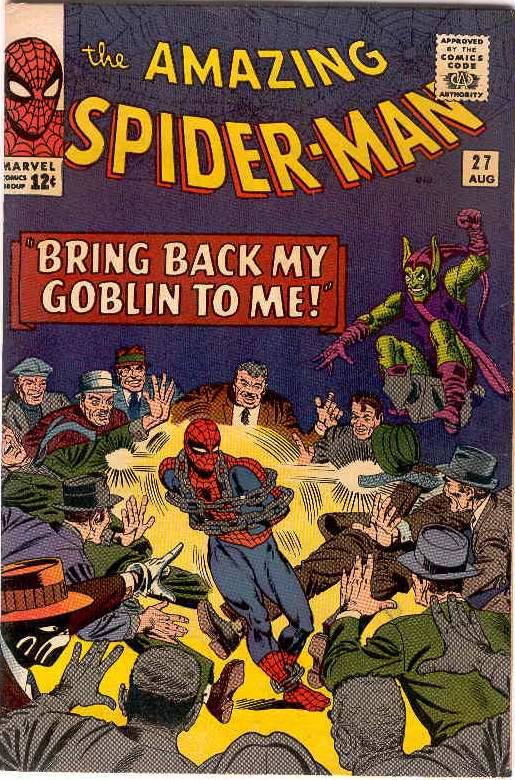
As many fans of Spider-Man comic books well know Spider-Man has an incredibly long history addressing street crime. The early Ditko Spider-Man stories vacillated to parables about science gone too far and crime noir.
Fans of the thus far five Spider-Man films and the more recent pathetic Ultimate Spider-Man cartoon are likely unaware of this long history since it’s essentially devoid in both. Sure Spider-Man might fight regular thugs, but that’s rarely if ever the plot or main thrust of the stories.
But it is in fact from Spider-Man comics that the most famous super villain gangster of all time, the Kingpin, originated. Spider-Man has tangled with Wilson Fisk countless times though admittedly rarely with the same intensity that Daredevil has.
Now sure on film using Kingpin is very unlikely given his affiliation with the Netflix Daredevil series, however Spidey actually has a whole host of other gangster villains with gimmicks which would make them film worthy.
Hammerhead
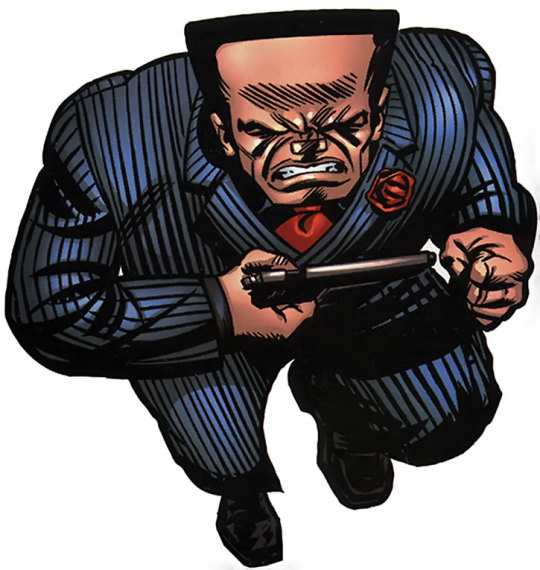
Silvermane
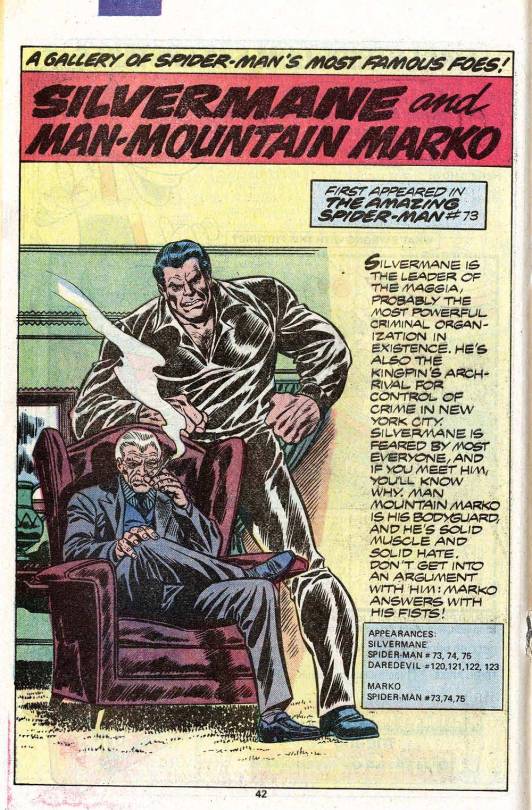
Don Fortunato
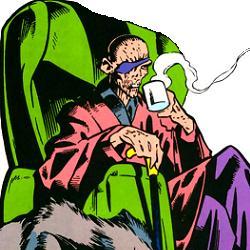
Tombstone
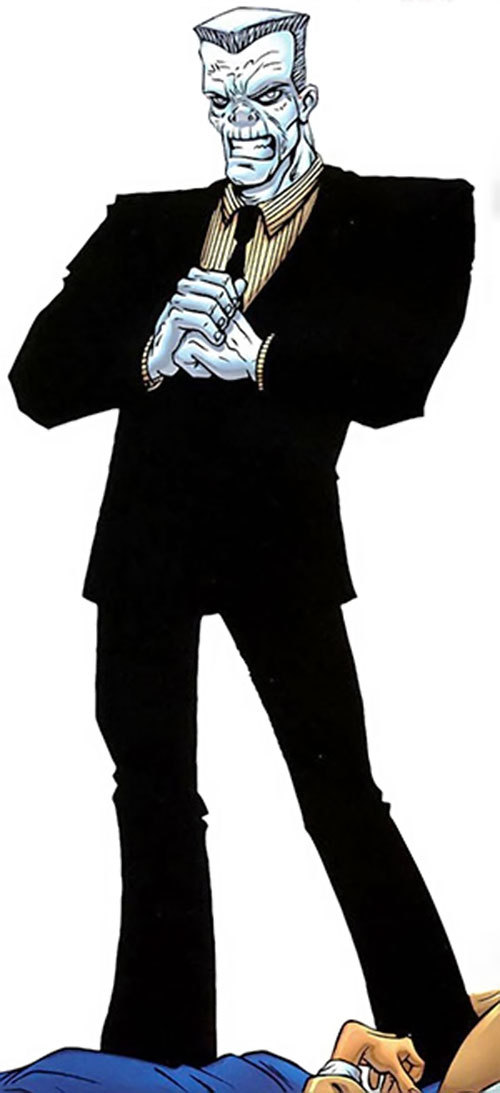
Man Mountain Marko
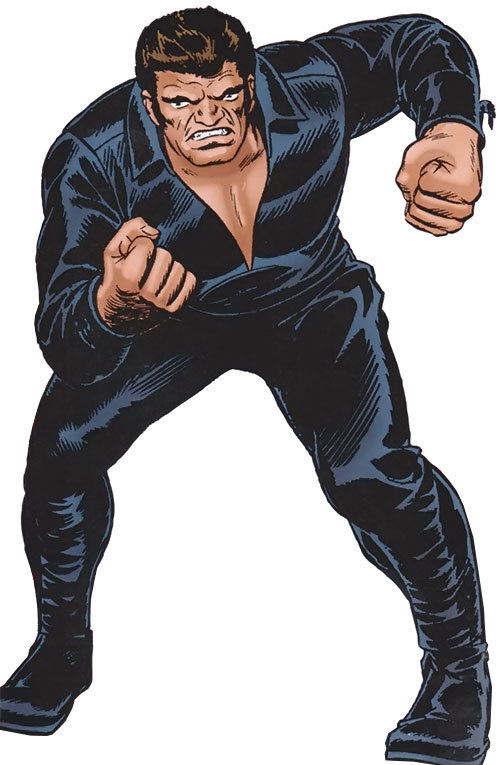
Mister Negative
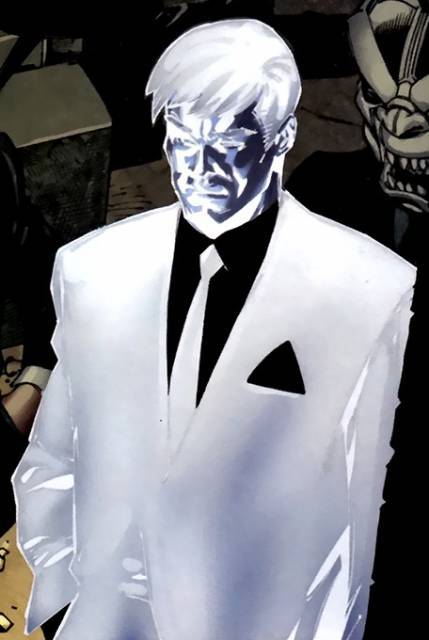
The Rose
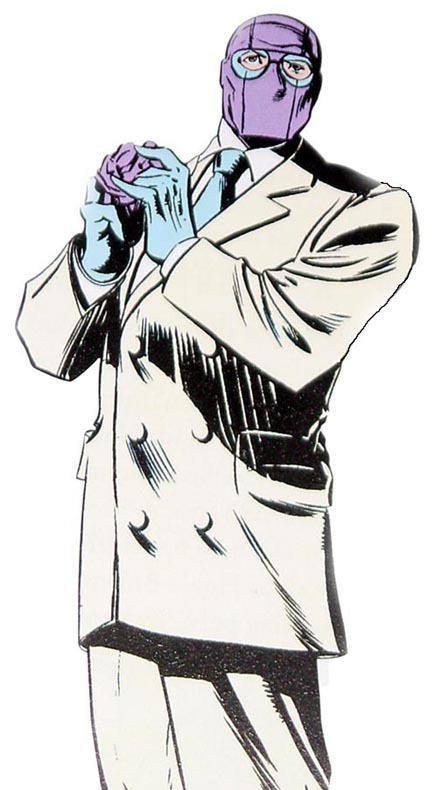
Delilah
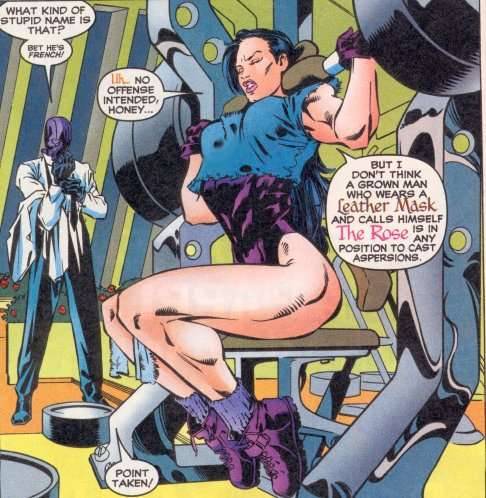
The Crime Master
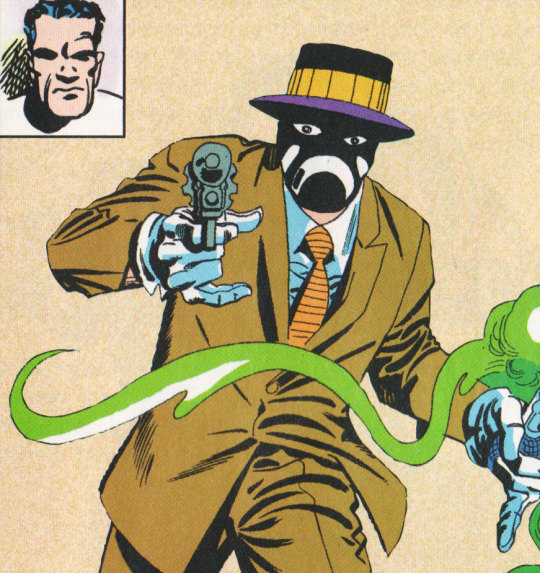
The Big Man

Black Tarantula
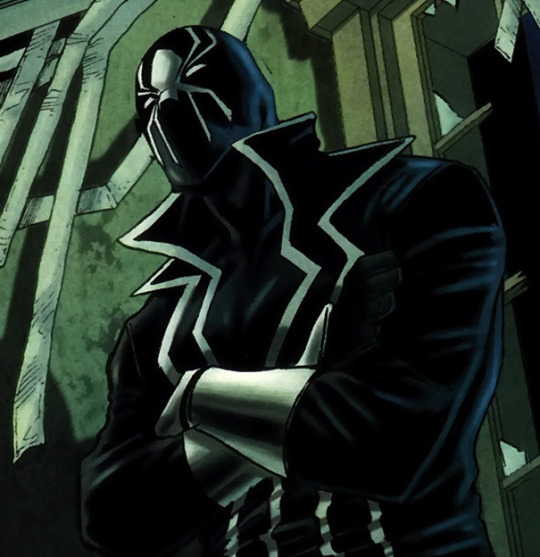
The Enforcers
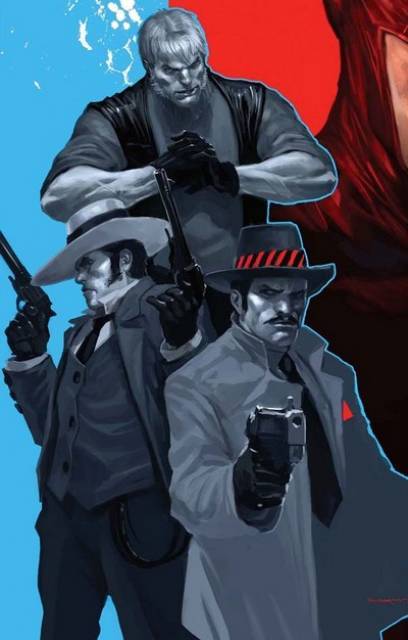
Gangsters one and all.
Gang war storylines have occurred more than once in Spider-Man’s comics and having him caught in the middle of one, trying to end the war for the sake of the civilians would present a realistic, complex and far more difficult to solve challenge for Spider-Man than ever seen before.
Spider-Man could come face to face with the realities of crimes which exist in our own real world and see how it’s not a battle with a true ending but one which he and other people must constantly resist all the same.
Spider-Man and the media
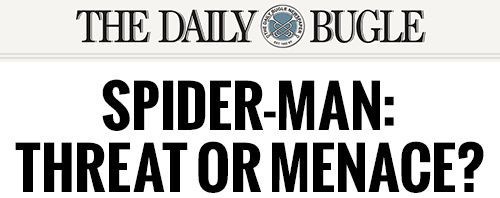
As perfectly cast as J.K. Simmons was as J. Jonah Jameson in the original Sam Raimi Spider-Man film trilogy it must be said the movies downplayed the character compared to the comic books.
Whilst he served the same basic function as Spider-Mans loudmouth skinflint boss who used yellow journalism to slander Spider-Man and make the city mistrust and hate him, he was ultimately a bit player in the proceedings of the trilogy.
In the comic books especially the early days of Spider-Man Jameson was almost the resident villain of the series, a lot of panel time was dedicated to him and his irrational vendetta against our hero. He and Spider-Man often exchanged harsh words and it seemed his persecution of Spidey was unrelenting. He was in fact one of the three most important recurring characters in the whole series during the original Steve Ditko run next to Spidey and Aunt May themselves.
Doing a movie which is actually specifically about Spidey’s relationship with Jameson and making the central focus the ramifications of Jameson’s smear campaign would not only be something original for a Spider-Man film but fairly original for a superhero film in general. Jameson isn’t a super villain nor is he truly evil. He’s just a greedy man with an irrational hatred stemming from deepset issues which themselves make him a compelling character.
The film could thus be about the abuses of power afforded to those who control the media and examine the responsibilities and role the press should hold, with a greater focus being upon the press’ obsession with celebrities and the detrimental effects they can have on their lives.
Once more this isn’t an enemy or a crisis Spider-Man can truly resolve or defeat, so much as learn to live with, which is once again something fairly unique for a superhero movie.
But just so we can have our bam smack pow superhero action we could draw upon one of two classic Spider-Man tales to generate a villain or two.
In Amazing Spider-Man #20 Jameson infamously helps create the Scorpion as a natural adversary to Spider-Man only for his creation to turn on him thus justifying Spider-Man save him. The Scorpion has never been done on film and fits Marvel’s mould of villains who are dark reflections of the hero. In fact that is why Jameson created the Scorpion, he was based upon a fellow (but bigger) arachnid.
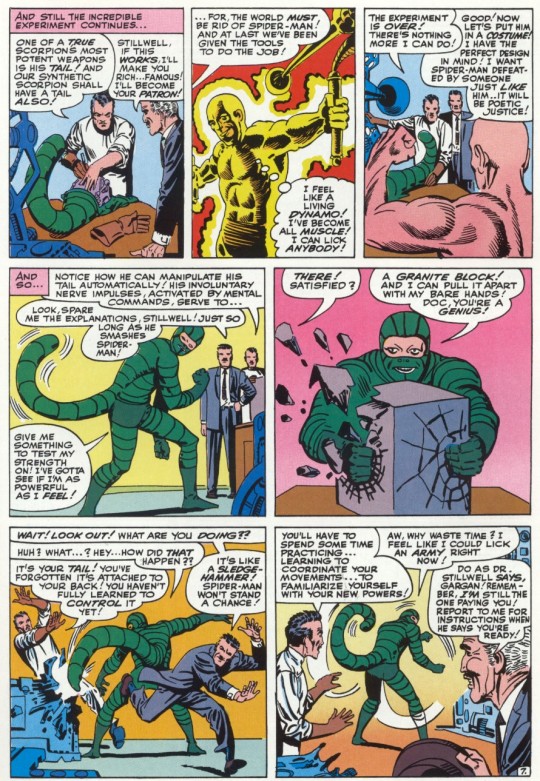
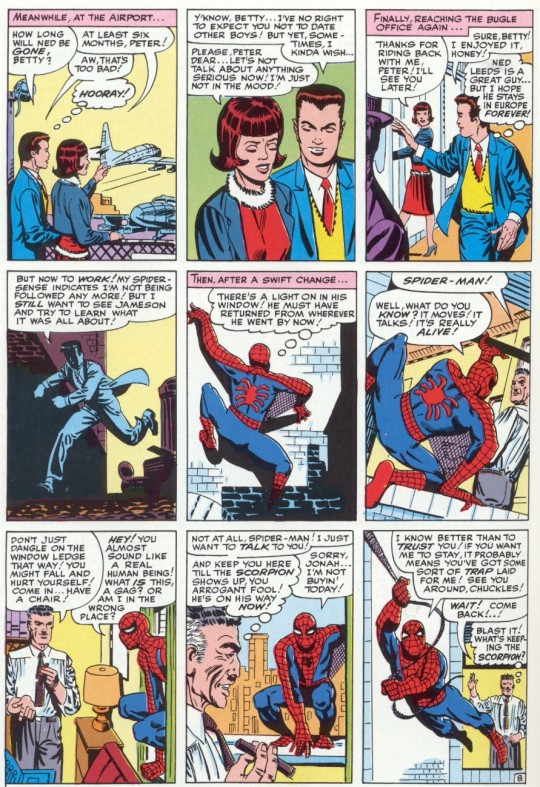
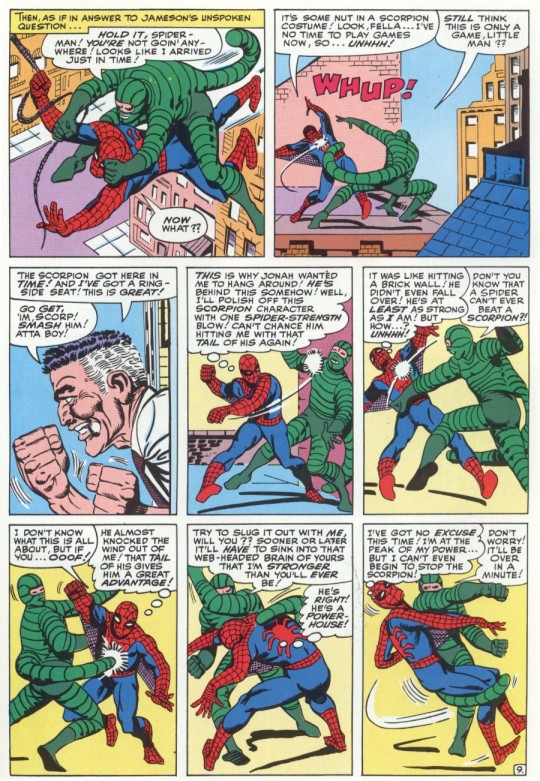
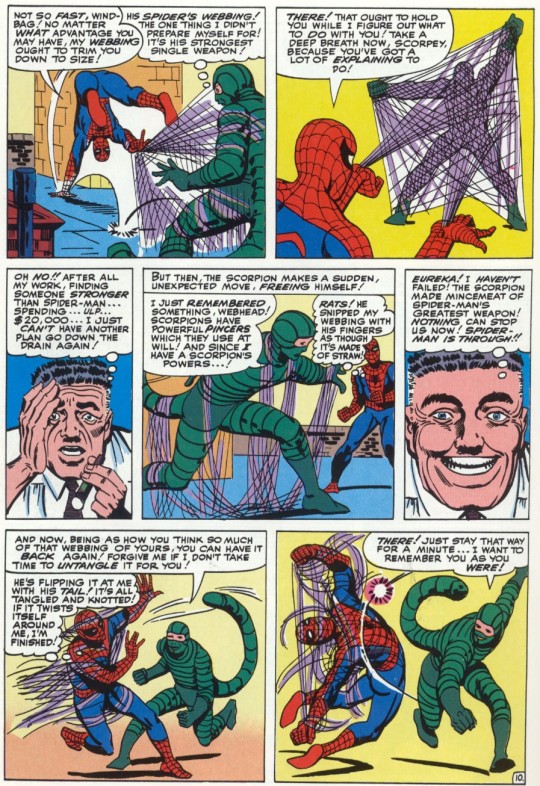
Alternatively we could draw upon a famous recurring element of Spider-Man lore, the Spider Slayers. Throughout his history Spencer Smythe and his son Alistair have created robots specifically designed to locate, capture and sometimes kill Spider-Man, with the designs of the robots offering a variety of interesting visuals. However many of the Spider Slayers were affiliated with Jameson who wanted to use them to rid the world of Spider-Man.
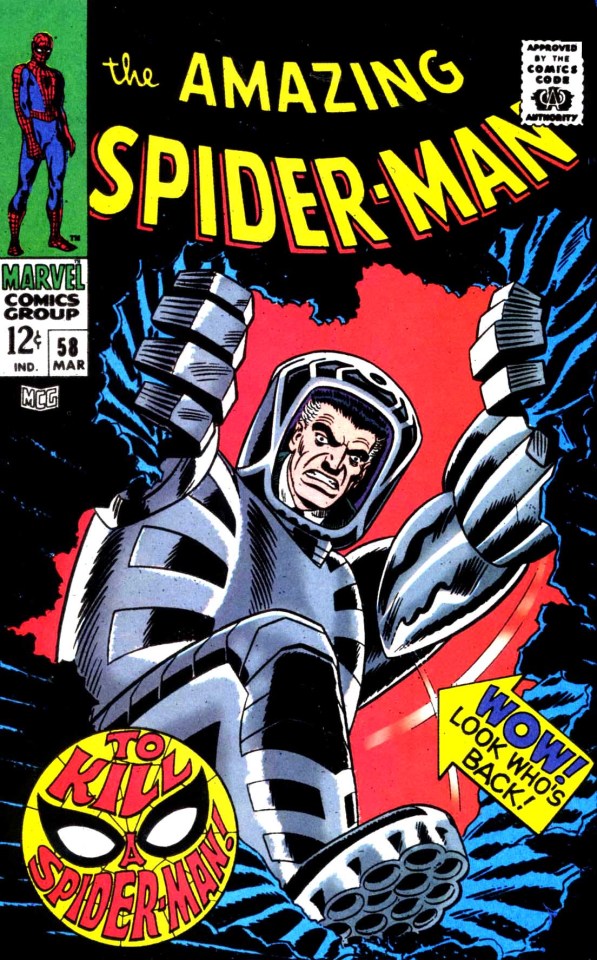
Perhaps one of the most famous Spider Slayer stories was the death of Spencer Smythe which involved Jameson and Spider-Man shackled together by a bomb counting down to their destruction. Adapting this would be a perfect way to bring the movie to it’s climax and focus in on the central relationship between Spider-Man and Jameson.
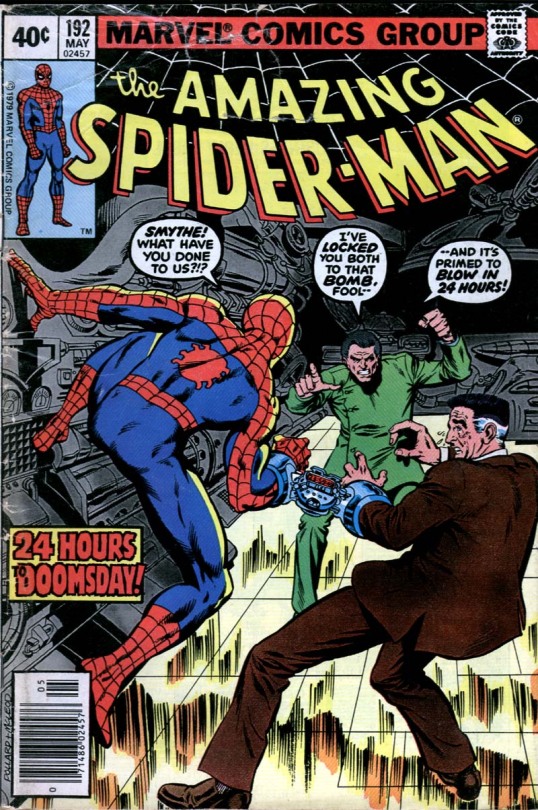
Peter Parker is a Mama’s boy
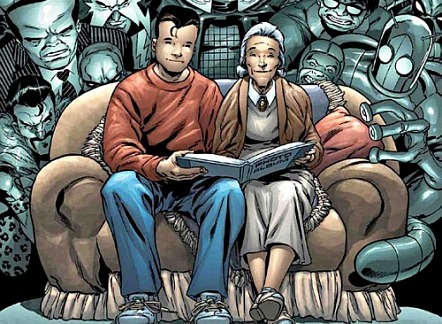
Love her or hate her, Aunt May is vitally important to the mythology of Spider-Man and his character. Hence she’s appeared in every Spider-Man movie to date.
She is also his mother. Not biologically, but in all the ways that really matter she is his mother.
Many stories (sometimes to an exaggerated extent) have showcased Peter’s affection for May and her doting attitude towards him. But like Jameson we’ve only seen this in the movies as part of larger plots where it isn’t really the point. When done right it’s really endearing and something relatable to most people.
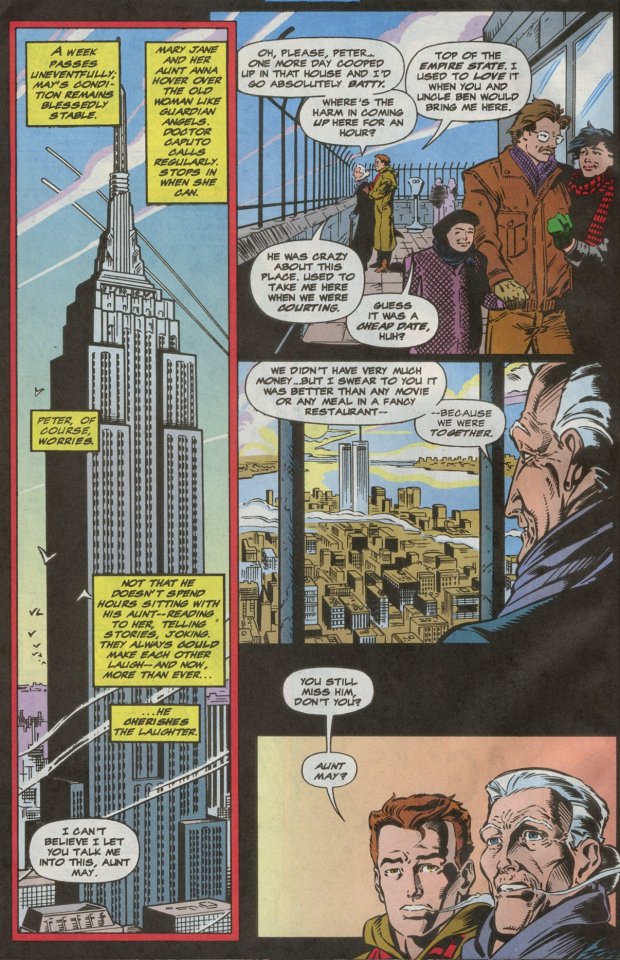
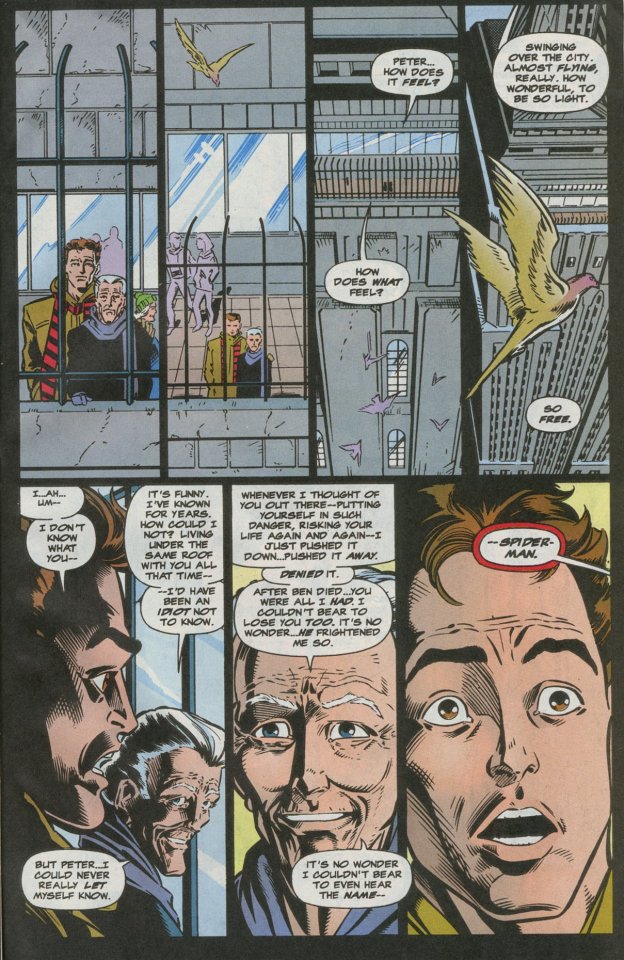
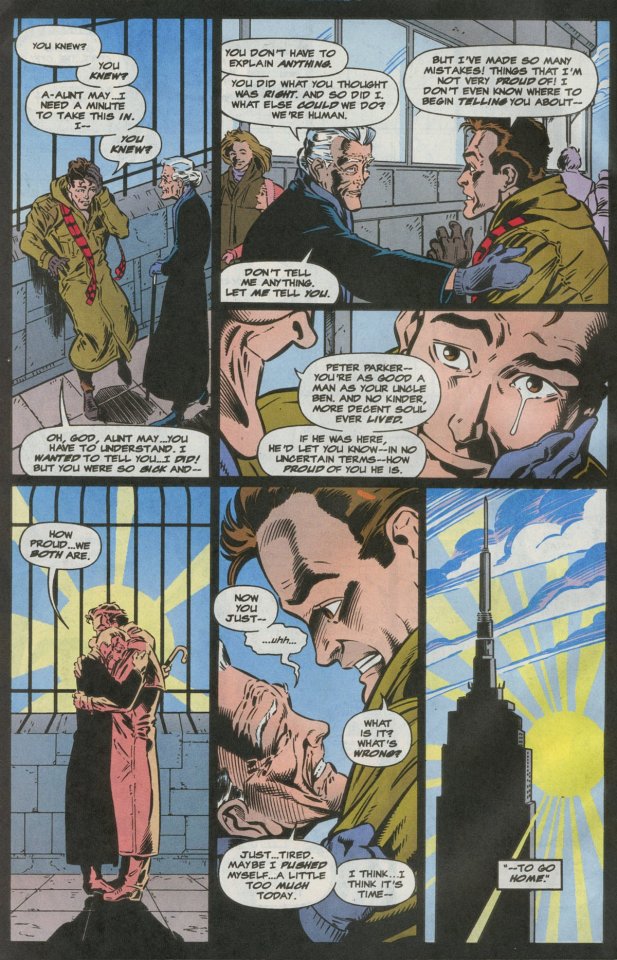
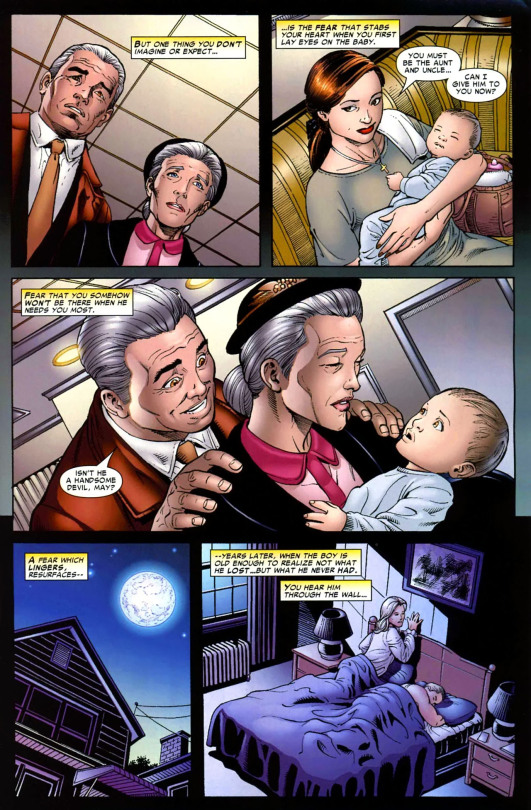
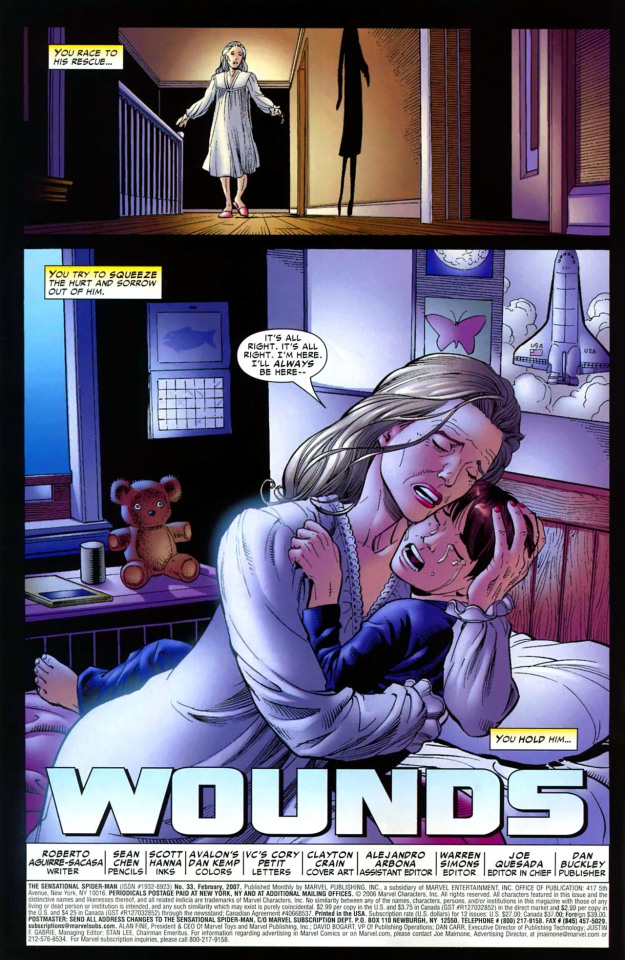
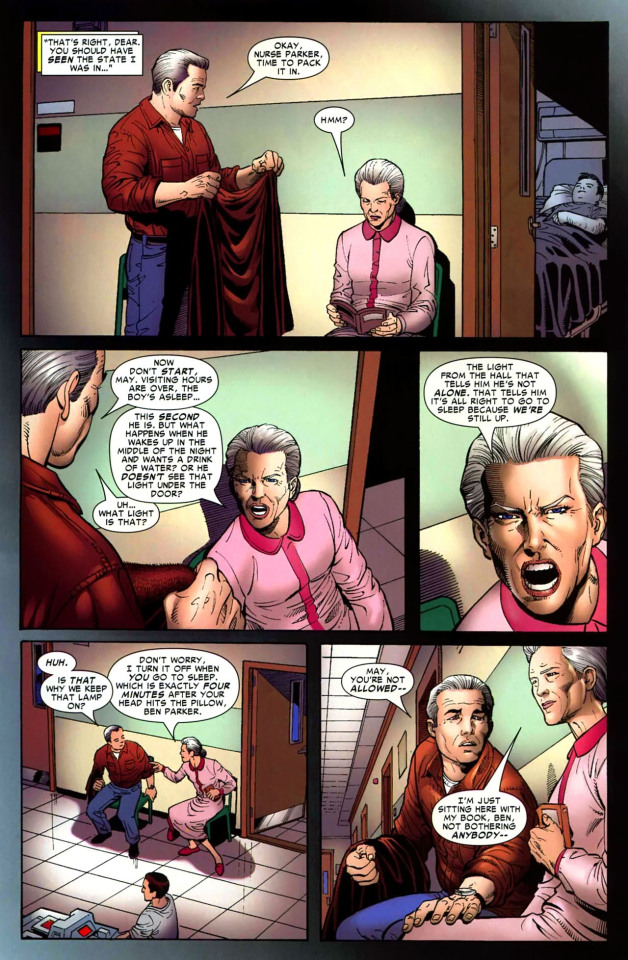
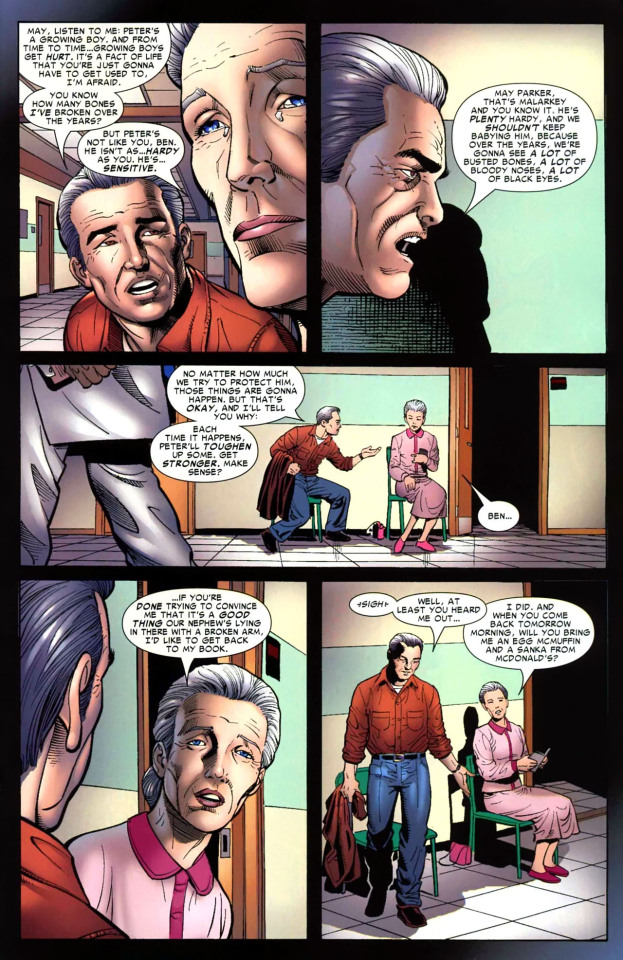
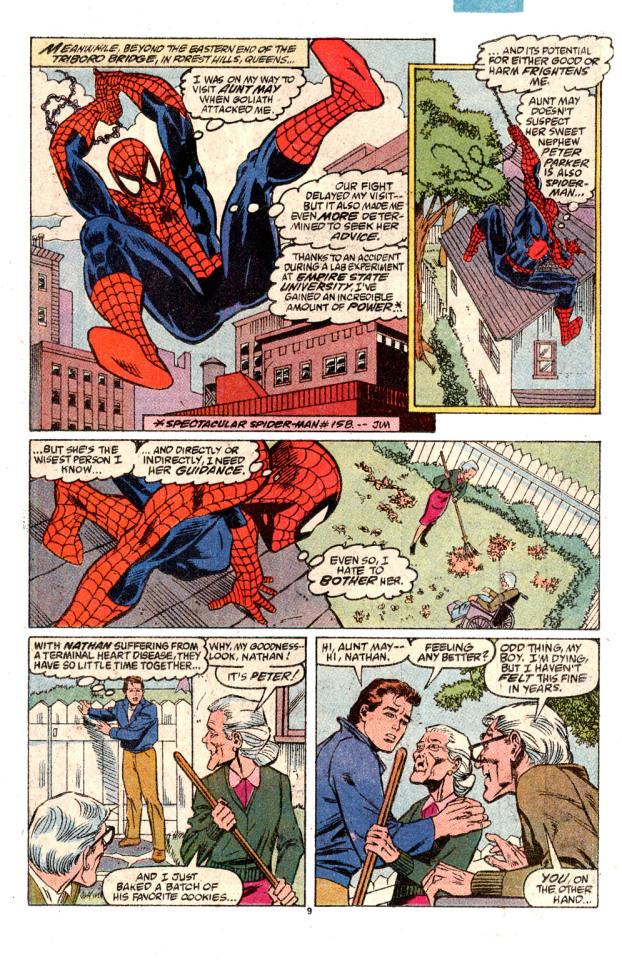
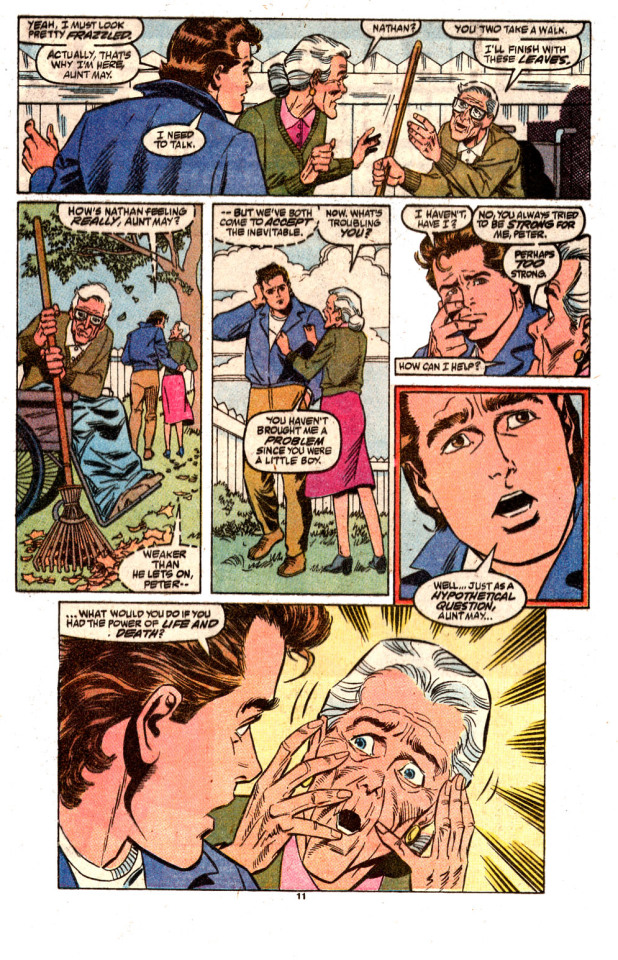
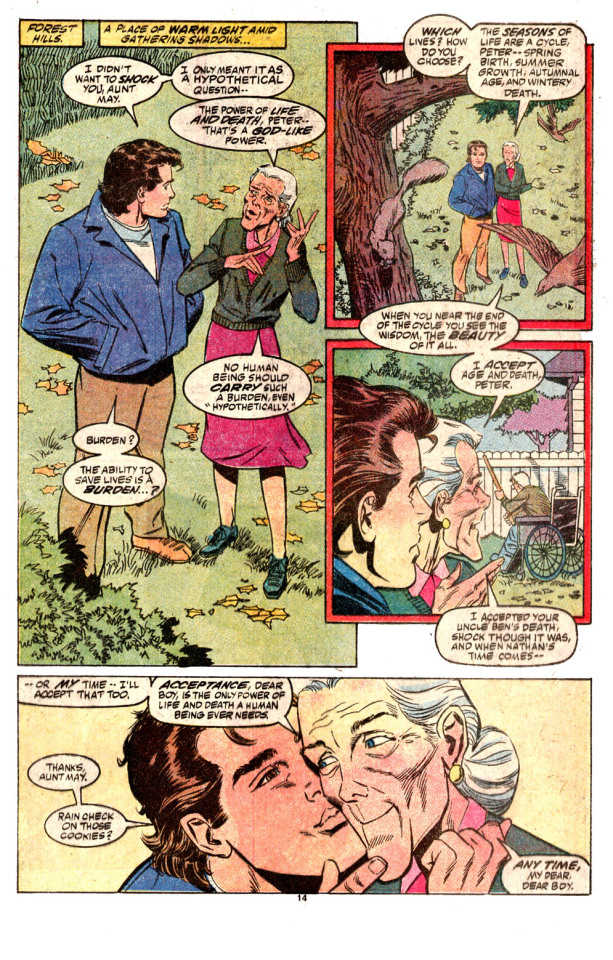
Instead of a Spider-Man movie which is about Peter Parker’s romance with a woman, his rivalry with a new villain, the mystery of his dead parents or (ugh) his teacher/student relationship with someone like Iron Man, why not make the heart and soul of this movie about a parent and child, specifically a mother and her son.
Films like Logan prove that that can work but the unique twist of this movie would be that the focus isn’t upon someone learning to be a parent or a father/son relationship or a mother/daughter relationship or even a father/daughter relationship. Rather it’d be the far less focussed upon mother/son relationship.
Even in movies which do focus upon a relationship like this things typically play out wherein the mother is fridged, or it’s about a woman learning to be a mother, or a woman struggling to survive for the sake of her son or where the relationship is strained (think Tony Soprano and his mother).
Instead this would be a movie about a kid and his mother figure coming to together to cope and survive in a world now bereft of the most important person in both of their lives who supported them both.
And the central basis of this movie could be arguably THE most iconic Spider-Man storyline of all time, the Master Planner trilogy. Allow me to give you some cliffnotes from the story.
A new gang working for a criminal called the Master Planner who plans his schemes meticulously so they go off without a hitch butts heads with Spider-Man. Meanwhile Aunt May is feeling incredibly unwell as Peter Parker goes to his very first day of college. Later she collapses and we learn that she’s dying, poisoned by a blood transfusion Peter gave to her many issues ago. A potential cure can be created from the expensive ISO-36 chemical.
Peter pawns most of his and May’s possessions to buy the chemical but the Master Planner steals it believing it could be of use in his experiments. Spider-Man uses a Daily Bugle journalist to help him get a lead on the whereabouts of the Master Planner and he proceeds to bust up the criminal underworld, desperately seeking information of the MP.
Finally he learns that the MP is in a secret underwater base so Spider-Man has to swim beneath the Hudson river, infiltrate the base, fight off the hordes of armed henchmen and finally confront the Master Planner himself, who is in fact DOCTOR OCOTPUS.
As they fight Spider-Man is trapped under several tons of heavy metal rubble, with water quickly filling the room and the ISO-36 just out of reach. Then in an endlessly homage and utterly iconic scene Spider-Man ruminates upon how he cannot allow himself to fail Aunt May like he did Uncle Ben and gradually summons all of his strength and in a supreme act of willpower throws off all of the rubble in the greatest Spider-Man splash page of all time.
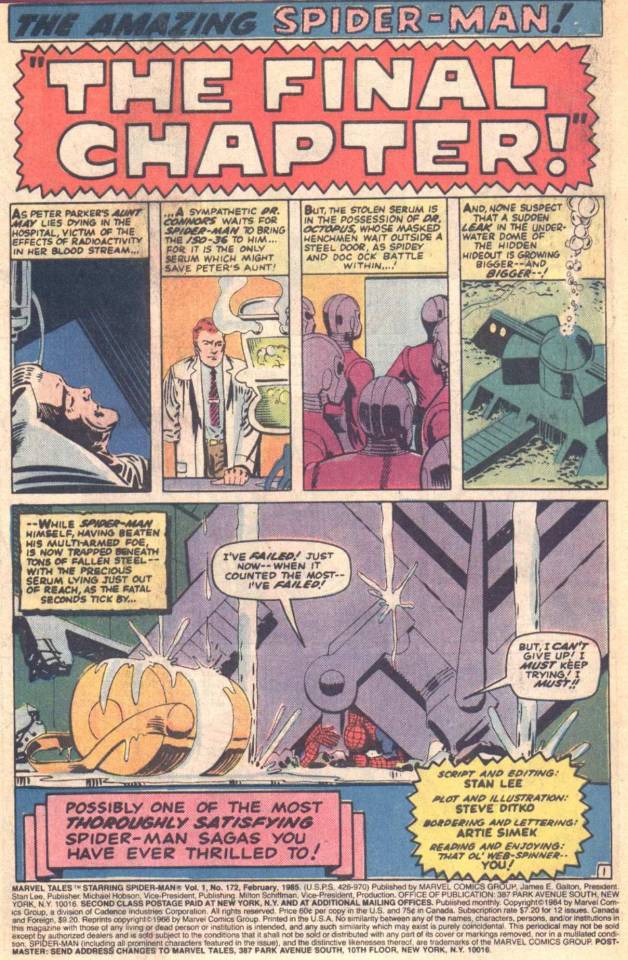
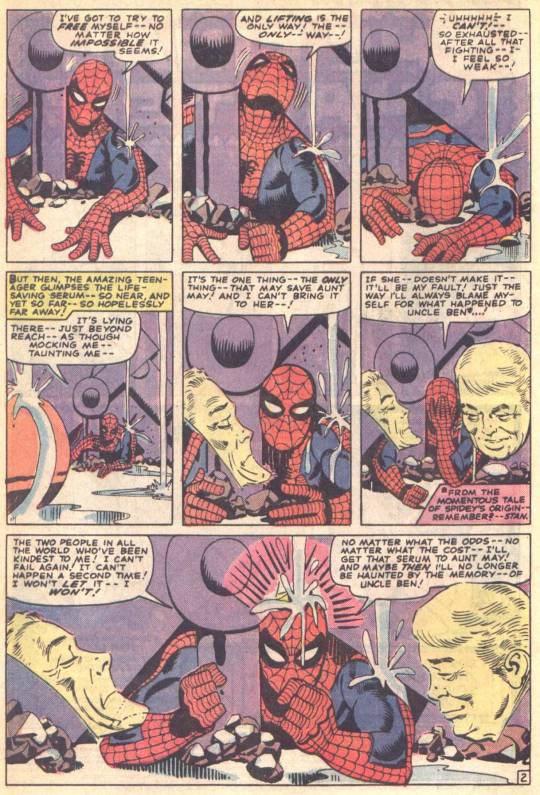
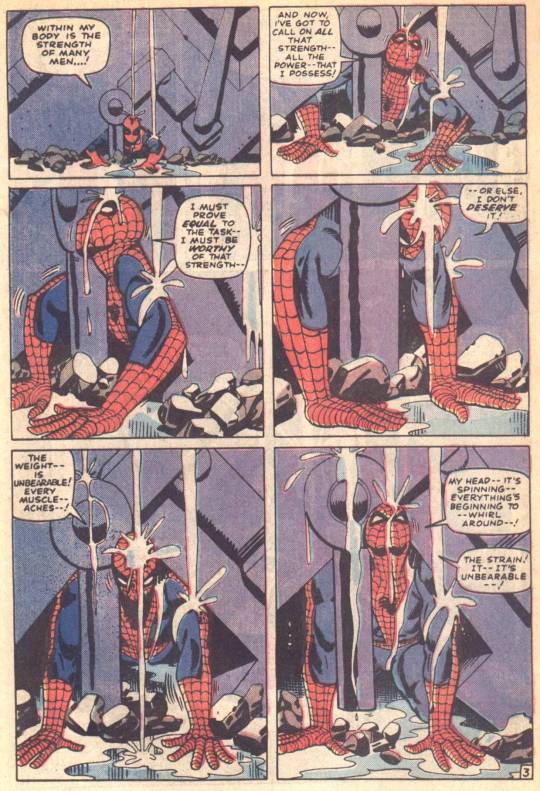
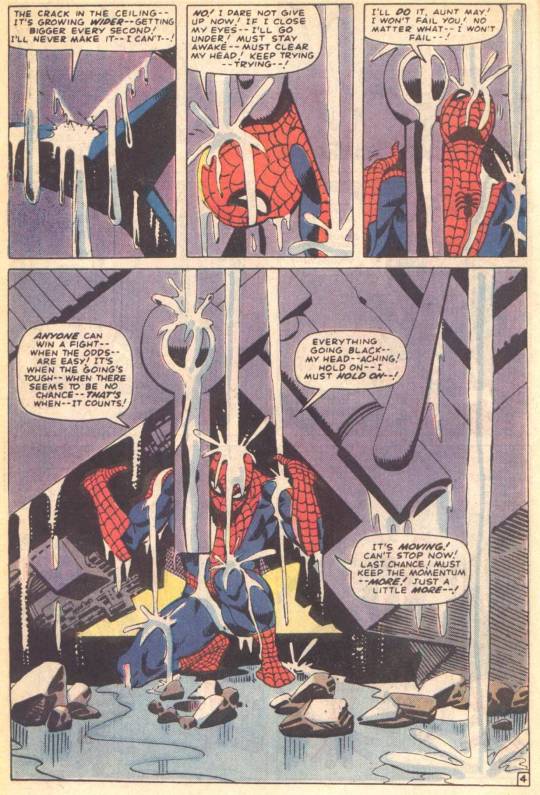
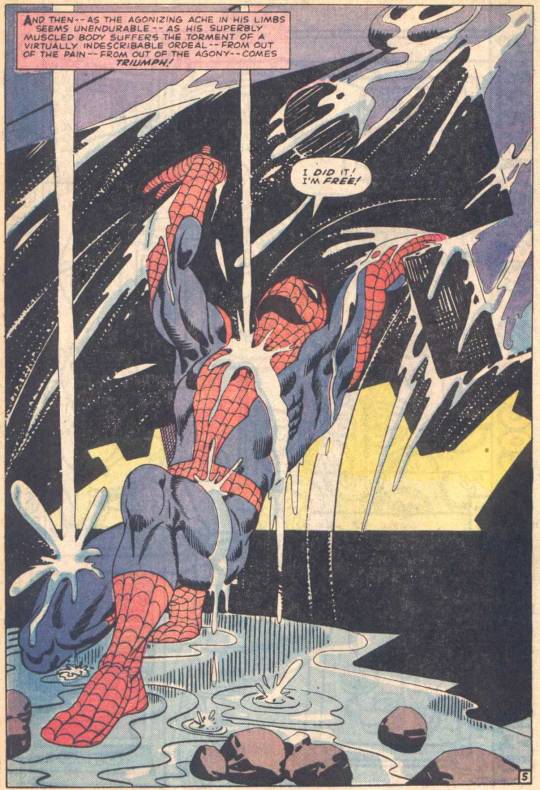
He then gets the ISO-36 swims back to the surface, fights some of Doc Ock’s goons underwater, then despite his exhaustion single handily kicks the rest of their asses before getting the chemical to the doctors just in time to save Aunt May.
Now sure that isn’t everything that happened and you’d have to tweak a few things to make it work as a self-contained movie about a high schooler...but...goddam...how does all that NOT sound like the most baller Spider-Man movie ever!?
There’s action, there’s tension, irony, human drama, heroism; it’s got everything!
Now you see those three idea I just tossed out?
Well with one exception all of them are based upon the original Steve Ditko run of Spider-Man. In fact not even all of the Ditko run, just the first 33 issues.
None of them involve retelling Peter Parker’s origin.
None of them involve repeating material or storylines we’ve seen in other movies before apart from Spider-Man fighting Doctor Octopus which is in my suggestion not even the point of the movie.
I just made all of those suggestions up off the top of my head based upon less than the first five years of Peter Parker’s existence.
I could probably make up even more if I cast my net further and spend a bit more time considering it.
So tell me again how there are no new ideas for a Peter Parker Spider-Man movie?
Tell me how the only way to make the franchise fresh again is to use another character other than Peter Parker?
Go on. I dare ya?
#Peter Parker#Miles Morales#Spider-Man#Ultimate Spider-Man#mcu#marvel cinematic universe#Spider-Man: Homecoming#Marvel#marvel comics#Aunt May#May Parker#J. Jonah Jameson#Scorpion#Mac Gargan#Spencer Smythe#alistair smythe#Kingpin#Hammerhead#Tombstone
31 notes
·
View notes
Text
Content Marketing – Is It Still King?
Changes In Content Writing
Content marketing has been around since well before the internet. Historically, content marketing practices by brands began to grow in the late 19th century as a method for attracting potential customers with valuable content. [caption id="attachment_5323" align="alignright" width="300"] geralt / Pixabay[/caption] The idea was that companies could focus on the needs and interests of their customers, rather than pushing product purchases, with publications such as magazines, booklets, or newspapers. Eventually, radio came along in the 1920s, changing marketing from the written word to audio, and commercial advertisements were born. By the mid 20th century, television became the new craze for marketing your content and products, followed by the digital age dawning in the 1990s. Today's content marketer knows that the initial philosophy of engaging viewers with valuable information is still crucial, but with the onset of mobile devices and capturing micro-moments, getting your message out is a whole new beast. This article from Think With Google discusses how Adidas changed their marketing strategy to fit with today's fast-paced global world. After realizing they were falling behind, they re-evaluated their global game plan and came to this conclusion:
To get this little revolution started, we had to come to terms with three new realities.
The consumer is in command.
The consumer needs to hear a single voice.
The cultural shift this requires is intense.
[caption id="attachment_5324" align="alignleft" width="300"] geralt / Pixabay[/caption]
The consumer is in command
Direct-to-consumer and wholesale buyers and merchandisers used to dictate the trends in our world. We controlled our launches and rolled them out in each country at our own pace. But now, consumers shape the trends. In our case, sneaker and lifestyle blogs have gone mainstream globally and social influencers have proliferated. We have a core set of advanced consumers and fans who drive interest in our products, innovations and storylines. The speed is relentless. In the past we could introduce a new line of shoes and nurture its growth in a measured period of time, region by region. We called the shots. But now, thanks to mobile, the information spreads so quickly across the globe that we run the risk of having unsatisfied consumers if the hot new product isn’t available in their market. We’ve had to shift from local launches to global launches, which affects everything from supply-chain coordination to our marketing programs and publishing strategy.
Learn more here: Empowered mobile consumers led Adidas to a cultural revolution
Solving individual needs and problems and doing it all in a seamless, user-friendly approach is what today's consumers are looking for. One way marketers reach out to engage their viewers' attention is by writing regular content via their blog.
Less Shared Content
For businesses, the art of blogging has grown by 800% over the last five years, according to TrackMaven. The problem is that social media sharing has gone the opposite direction, down 89%. In other words, companies are writing longer posts more often, but they aren't being shared as much among their social communities. People tend to share posts that stir their emotions, so if your blog isn't written in a way that evokes certain feelings, your work is less effective. Writing and curating content isn't easy for most and takes a decent time commitment. There are a number of tips that can help increase your share-ability and writing speed, and who better to explain this than Neil Patel:
youtube
It is hard to make every blog article touching or humorous, but if you just relax and write from your heart, it comes out in your post. As the above article from Think With Google mentioned, a company needs to align their philosophy with one single voice or mission. If you sell workout shoes, then focus on stories that inspire and motivate the people you are trying to market to. If you want to teach people how to knit, become an expert on the subject, find your voice, and make it entertaining to those that share your passion.
Let Me Entertain You
The video by Neil Patel addressed some of the same key points as this article, but this post by Entrepreneur offers some great pointers for writing appealing content that your audience will want to share:
2) Entertainment. In a study conducted by Jonah Berger, author of the popular book Contagious, he looked at almost 7,000 New York Times articles to assess which got shared the most. He found that [caption id="attachment_5325" align="alignright" width="300"] Photo-Mix / Pixabay[/caption] positive news was more likely to go viral. Most people like to be the “bearer of the good news” rather than a “Debbie downer.” He also found that content that elicited high-arousal emotions such as delight, astonishment, excitement, awe, anger, frustration or anxiety got shared more than one that evoked low-arousal or deactivating emotions such as sadness. Another study conducted by Ipsos showed that 61 percent of online sharers share interesting things; 43 percent share funny things and 29 percent share content that is unique. Takeaway: Create reactive content. Write content that triggers positive high arousal emotions. Make sure that your headlines evoke curiosity and awe. Include stories as they can make any piece of content engaging, memorable and shareable.
See the other tips here: The 7 Secrets to Shareable Content
The idea that excitement enthusiasm breeds enthusiasm holds true with social sharing. If users see a post that has been shared a lot, they are more likely to share the info as well. If possible, use share buttons that provide the number of times a post or image has been shared. Don't be afraid to take a stand about your fundamental convictions and causes you believe in. You will inspire your readers that feel the same way, and they are more likely to pass on something they feel passionate about. It does take practice to become good at anything, but if you don't like writing your own content, hiring a professional content writer might be the answer.
The article Content Marketing – Is It Still King? is available on Steve Smith
0 notes
Text
God Helped Me Realize I wasn’t Straight
Ever since I was a kid, I’ve been asked “who do you like?” and I’d pick someone. Usually a boy who was nice or more feminine. As I grew older, it became clearer and clearer to me I had a life laid out for me: get a boyfriend or two, get engaged, get married, and have kids. I might have a job, but those steps were a necessity. They were from the Bible. From the women and older girls I knew.
Yet.
The first crush I had was on Sam W. He was a sweet kid, in my class most of my life. I thought up silly daydreams, like us running into each other in the hallway and accidentally kissing. I thought nobody knew, but then a classmate, Jeff, asked Sam if he’d ever date me. He emphatically said no. At first, I was hurt. As the days passed, I felt relief. I didn’t want to date him.
The second crush didn’t last long enough worth mentioning, but the third, Sam B., I told straight up I crushed on him. He told him how I just wanted a friend, not a boyfriend. He told we could be friends.
I created a list in my head of all the qualities of what I wanted in a guy I’d end up with. Not much taller than me (like no more than half a foot). Long hair. Glasses. Well trimmed beard if any. Sweet and kind. Able to deal with my frequent bullshit. Good to hang out with. Similar interests to mine. Able to have nice discussions with. Doesn’t own a dick and wouldn’t mind changing it (and not just for me just in general).
That’s when I started talking to him again, Allan. We first met briefly a few years prior when we were freshmen. He helped a cousin move into my college, and we talked for hours and exchanged numbers. We started talking again over text and other places online for a few months before we asked ourselves “are we dating?” and for the first time in years I felt it. A pull or something from God Himself. It was a rare, rare occurrence for me, and He told me “go for it.”
So I did.
We dated for the better part of a year, and the whole time it felt...awkward. I could never figure out why. He fit everything on that list. I liked him a lot! He was great to me, patient, understanding of the whole “no idea how I feel about sex” thing. We could nerd out on animation. Yet. There was something missing I could never pinpoint. There was a time he tried to come visit me, and when things didn’t work out...at first I was pretty upset but then I felt the same relief I felt years prior when the Sams told me how they felt. Did I really want to date this guy?? But he was so perfect!!
Then I saw my own writing on this very blog describing girls and women. Everything clicked into place. I told him the next day, which got a “ooooh, yeah that makes sense.” We still laugh about it to this day. He tries to talk up his cousins and other friends up to me from time to time. I remind him I’m definitely not made for long distance.
Starting about a month ago, I got thinking more and more about this relationship. I started asking myself “why did God want me with this guy??”. It hit me. Y’know those stories from the Bible when people try to go against God? Like in Jonah and Jonah tries to convince God Nianevah isn’t worth saving. Or when Moses tells God of his terrible public speaking skills. Both times He was like “uh-huh, suuuurrreeee” and then shows He knows better. This was one of those times. I was telling myself -and by extension Him - that I’m definitely straight; I just need any potential boyfriend to fit these qualities and I’ll totally love him!! So He pushed me with such a guy, going “suuuuuuureee you’re straight, just date this guy and you’ll definitely like him” the whole time.
I cannot tell you how important it was for me to start thinking about this critically. For years I tried telling myself over and over again I was straight, I just needed x and y and z and then I’d “get it.” Having a relationship with Allan showed just how wrong I was. He wasn’t the ideal boyfriend because he was a boyfriend. I couldn’t just force myself to love someone I felt not attraction towards, and it’s not fair to myself or him to stay in a relationship for x period of time to try and “get it.”
0 notes